#fire emblem three houses meta
Text
My Analysis of the Best Paired Endings in 3H (Part 19: AM Sylvain/Felix)
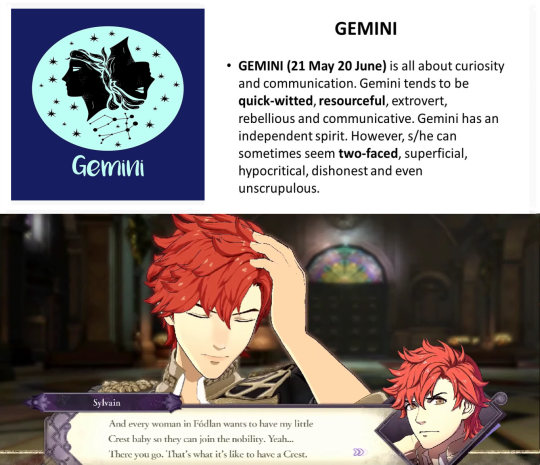
Sylvain: I hate Crests, you know. They mess everything up in life, the future, everything… Just because I have a Crest, I'm treated as the heir, and my older brother nearly killed me because of jealousy. Bitches... they swarm to me, no, to my blood, like ants...
Mercedes: …I'm sorry. Did I remind you of something you didn't want to remember?
Sylvain: …Sorry, I slipped. Ah, damn, I didn't mean to show such a pathetic side…
Mercedes: …No, I'm glad. It feels like I saw your true face for the first time.
The localization watered down, omitted, or completely rewrote a lot of the more interesting gender-related dialogue. In his Japanese B-Support with Mercedes, the word Sylvain used for women was "女ども" (onnadomo). This term is derogatory. It is used to refer to females in a demeaning manner and carries a tone of contempt or disdain. It is considered offensive and is avoided in polite conversation. A comparable word in English might be "bitches" or "wenches."
Sylvain: …Oh, what's up, Professor? Haha, sorry, didn't notice you at all. We've been meeting quite often lately. Oh, could it be that you're interested in me?
(Female Byleth): ...Just kidding, it's a joke. Please don't make such an obvious disgusted face.
(Male Byleth): Sorry, my arms are reserved for girls only! I'd prefer not to lend them to bastards.
The localization also changed some lines in Sylvain's B-Support with Byleth pretty significantly. If you are playing as Male Byleth, he refers to males as "野郎" (yarou). It's an informal term that is somewhat similar to "guy" or "dude" in English, but it's more derogatory. It's a gendered insult and it suggests that the person being referred to is undesirable or contemptible in some way. It implies qualities like rudeness, roughness, or unpleasantness. It is also considered offensive and impolite, and it's generally not used in polite contexts.
Sylvain: My brother was always a truly irredeemable bastard. Selfish, conceited, and arrogant. I've always had to clean up after him…even after he died. But, thinking about it, if my brother, not me, had been born with the Crest… Would I have become like my brother, or would there have been a different fate for me…?
"Yarou" is often translated as "bastard". In Hopes, if you take Sylvain on an expedition and ask about his likes, he says it's talking to girls. If you ask what he dislikes, he says it's being surrounded by guys, and he uses the same term. And he often used it when referring to guys in general, such as during teatime. I think he was even more of a misandrist than a misogynist, and it's a shame that wasn't as apparent in English because it's pretty integral to his character.
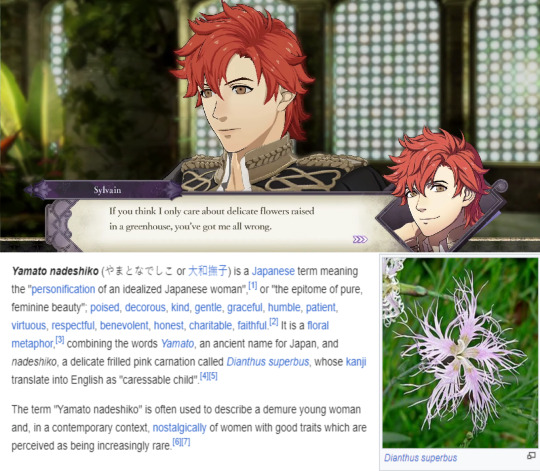
Sylvain: If someone is in trouble, you help them. That's what a knight, no, what a human being does. Whether it's a cute girl or a rugged big guy, it's the same thing.
Ashe: …!
Sylvain: Hey, don't give me that look. Are you falling for me? Unfortunately…
Ashe: What are you talking about? …I'm just a little surprised.
Even though Sylvain disliked most women, he still vastly preferred their company over men. In their B-Support, he saved Ashe's life, and Ashe came to thank him (quite similar to Sylvain's A-Support with Felix, actually). And he basically told Ashe "no homo". In the localization of their C-Support, he asked Dimitri to come to town together with him to pick up girls. But in the Japanese, he simply encouraged him to invite girls out to dinner on his own.
Sylvain: Hey, Professor. If you're free, wanna go out to the town together?
(Female Byleth): I found a place with delicious food. I thought I had no choice but to invite you, Professor!
(Male Byleth): In search of unseen beauties… No. Just kidding. Please don't give me that look.
While there are plenty of hints that Sylvain is bisexual, I think it makes perfect sense that he can't end up with Male Byleth or any other male character except for one. He had a VERY specific type. I don't even think Female Byleth was truly his type. But ya know, self-insert.
Sylvain: Dorothea, Hilda, Mercedes… Lady Rhea is also quite the beauty. Ah, the Officer's Academy is great, Professor. Beauties everywhere you turn! Haha!
So, what was his type? Well, he tells you on the first day of school who he was interested in. Three girly girls and Lady Rhea, who represents the Mother Goddess archetype, the embodiment of the divine feminine principle.
Sylvain: Professor, have you seen Felix? He's always disappearing when you take your eyes off him.
Byleth: I saw him at the training ground.
Sylvain: Well, I thought it might be something like that. Sorry, Professor. Thanks for your help! Taking care of horses, you know, it's quite soothing. They repay trust with trust. Sigh… In that regard, dealing with girls is quite tricky.
Sylvain liked damsels in distress he could swoop in and help. He thought Hilda was cute until he learned that her "delicate flower" act was insincere. And he was attracted to Dorothea, whom he compared to a beautiful flower in bloom, until he suspected she had an ulterior motive. On the day he was looking for Felix, he said he liked looking after horses because, unlike girls, they can be trusted.
Yuri: Oh, is this what they call mutual affection? I'm up for a rendezvous anytime… But next time, could you use better lines than when we first met? That was terrible! "Hello, young lady, delicate as a little bird! Would you care to chat a bit over there…"
Sylvain: Oh, come on, I already apologized plenty for mistaking you for a girl! How many times do I have to say it!
Yuri: I didn't really need an apology, you know. Look at this face; there are plenty who make that mistake. In fact, I even think I should have conversed with you, even if I had to pretend to be a woman. There's nothing wrong with maintaining a relationship with the future Margrave, right?
Sylvain: What an enthusiastic pick-up line… I can't help but feel strange myself.
What mattered to Sylvain was whether his brain registered someone as a girl. He tried to woo a crossdresser at a harvest festival. And the pick-up line he used on Yuri was changed in the localization. He called him "delicate as a little bird" in Japanese. And he was not turned off by the idea of Yuri pretending to be a woman with him.
Sylvain: ...Sorry. Well, I understand, but it seems my mind was refusing to comprehend... Certainly, you... I mean, you're a woman. Yes, a lovely young lady, indeed. Oh no, I've been rude. I'm terribly sorry, miss.
Leonie: What's with that tone...
Sylvain: I really am sorry. This is a first for me, too. Even if Leonie is ro… I mean, even if she's an active girl, something like this…
Leonie: You were about to say "rough", right!?
He knew Leonie was a girl, but his mind just didn't see her as a one. He used the word"粗雑" (sozatsu). It means "rough" or "crude" in English. Later, he compared her to a sunflower, rather than a delicate flower. The word he used for "delicate" was "可憐な" (karenna). And that's the word he used when hitting on Yuri.
Sylvain: It might also be one of the knights… Oh, wait, me!?
Ingrid: I'll hit you.
Sylvain: W-wait, I was just kidding! I'm against violence! Being too rough ruins a beauty, you know! ………… Uh, well. I-I mean, when I say "beauty," I'm not talking about flirting or anything, yeah!
In his A+ Support with Ingrid, the Japanese word he used was "乱暴" (ranbou). It means "rough" or "violent" in English. It can refer to behavior that is aggressive, forceful, or lacking in restraint.
Sylvain: I'm weary from the nonstop battles. A gentle and beautiful young lady who can heal my troubled heart, I wonder if it's lying around out there somewhere…
(Best Answer): It might appear someday.
Even his notes to the advice box suggested that his ideal partner was a "Yamato Nadeshiko". The term describes the "flower of Japanese womanhood" or "traditional daughter of Japan". It's a nostalgic term for the perfect woman under the ideology of Japanese patriarchal society. Sylvain adored traditional femininity and wanted a partner who was the epitome of feminine beauty.
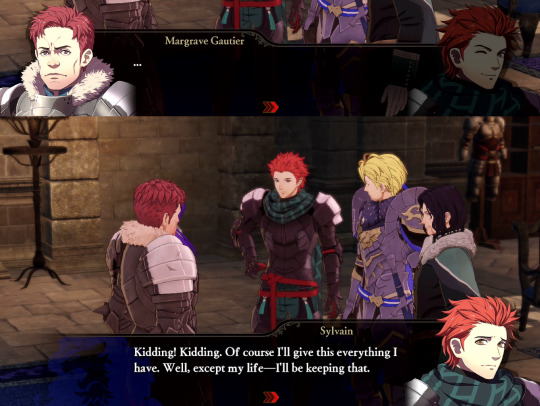
Sylvain: To be honest, I left home without telling my father, even though the country was in a difficult situation. Haha, I can imagine my father's angry face. "That idiot son of mine…" Haha, scary, scary…
But it was not because he was interested in upholding patriarchy. In fact, it he hated patriarchy and did not have a good relationship with the men in his life. His father was known as the "Wall of Ice". Matthias only cared about whether he had a Crest and could wield the Lance of Ruin. He didn't have much regard for his son's life and wanted him to take out a group of bandits by himself to earn his inheritance.
Ingrid: As you know, Sylvain and I have known each other since we were children. In the past, he often had bruises and other injuries on his face and body. Every time I asked, he would say he got them during training, but still…
And growing up, Sylvain was regularly beaten by his older brother.
Dimitri: Who's naïve and serious…? Besides, compared to you, most men are probably the same.
Sylvain: Oh, really? A man who gives a dagger as a gift to a girl he likes is quite…
Dimitri: How many years ago was that story? …If I seriously slap your head, will you forget about it?
Sylvain: If I were hit with that monstrous strength, I'd die… It doesn't sound like a joke.
His Japanese voice acting during his C-Support with Dimitri conveyed a lot more distress than the English version did. Because of how overly serious Dimitri was, and his history of being abused, he genuinely could not tell that he was just joking about hitting him.
Sylvain: Ah, damn it… Joining the Empire… I wonder what Father would say… And then there's His Highness… He's definitely furious, right? That guy, when he's angry, he's downright terrifying… I wonder how I'll be killed… Just imagining it makes my legs tremble. However… it's your decision. I'll follow you…until the end. Haha, I wonder what's gotten into me. I should be scared out of my mind… and yet…
If you recruit Sylvain into CF, you'll learn that he was terrified of Dimitri's anger. He was a childhood friend, but he was never as close to him as he was to Ingrid and Felix. Dimitri was, after all, the future patriarch of the Kingdom with superhuman strength. Which would be kind of intimidating to an abuse victim. In CF, he calls Dimitri a stubborn "yarou". While he is on good terms with him in AM after his boar phase, he doesn't even have an A-Support with him.
Sylvain: Thinking that he's in the next room makes me hesitate to invite a girl over at night. I'm already scared and scared of the scolding the next morning...
(Best Answer): Maybe I should reconsider the room assignments…
Sylvain's note to the advice box was about how he was afraid to invite girls to his room because Dimitri was next door. He didn't take his scoldings from Ingrid or Felix very seriously. But Dimitri's seriousness seemed to remind him of his father. And Sylvain was deathly afraid of his father. I'm sure that's why he felt like he had no way out of his arranged marriage.
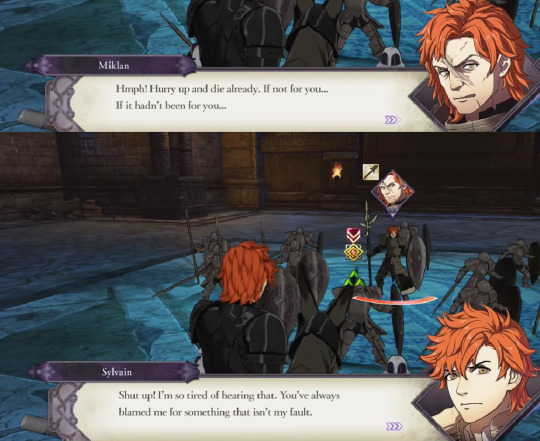
Sylvain: As someone with a Crest, I was raised with great care by my parents. But my older brother, who didn't have a Crest, was suddenly treated very coldly when I was born. …My older brother even pushed me into a well and abandoned me in the snowy mountains. I understood it even as a child. I had taken everything from him. How could I complain in front of someone who wanted a Crest but couldn't get one? So, the persistent stares of women, the appraising looks of noble daughters… I had to smile and accept them. …Because I had the Crest.
Sylvain bears the Crest of Gautier which is associated with the Death Arcana in Tarot. And the theme of "death" certainly played a large role in his character arc. Growing up, he was constantly told that he should go die and his brother tried to kill him. But Death doesn't mean literal death. It signifies a time of significant transformation, transition, and change. The old version of you needs to "die" to allow the new you to be created.
Sylvain: Ever since King Lambert passed away, I hardly get to see my childhood friends anymore…
Death also represents a resistance to change. In Hopes, if you take Sylvain on an expedition and ask him about his memories of the past, he sadly recounts how he and his old friends stopped hanging out much after King Lambert died. Sylvain would have been fifteen at the time. The same age he was when he hit on Lord Gwendal's daughter, prompting Ingrid to finally leave her room out of concern for him.
Sylvain: Actually, I have a history with Lord Gwendal. Yes, that was a story from many years ago. I met a lovely young lady, fell in love, and was nearly killed by her father… And that father happened to be Lord Gwendal. Oh boy, I was truly prepared to die at that time!
In Japanese, Sylvain's Classic Mode death quote uses the word "覚悟" (kakugo). It means "prepared for" or "mental readiness." And in Japanese, he uses that exact same word when talking about the Lord Gwendal incident. Sylvain's childhood antics (such as hitting on Ingrid's grandmother) could be seen as a harmless ploy for attention to compensate for his terrible home life. However, his involvement with Gwendal's daughter appeared to be way more serious.
Sylvain: …Well, whatever you think, Professor, I don't intend to change my attitude. You see, I may be a good-for-nothing, but I'm still a noble with a Crest… I try not to get involved in serious relationships. They only bring trouble. Eventually, I'll be quietly married off to some suitable partner and settle down.
Sylvain was extremely disingenuous with girls. He would use them for sex, then dump them in public. He was dreading the fact that his life would change after he got married and he blamed them for it.
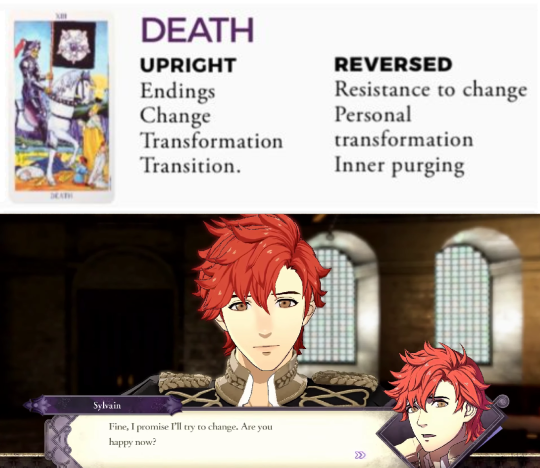
Ingrid: Just… childhood friends, right? Then why do I have to clean up after your messes?
Sylvain: Haha, nobody asked you to do that! Well, just think of it as your role and accept it. For some reason, it's been like this since we were kids, and it'll probably continue.
Ingrid: …Continue like this? So, you don't have any intention of changing your ways!?
The only way Sylvain knew how to cope with his fate was by pretending that he just couldn't resist falling in love with every cute girl that he laid eyes on. But the truth was that he disliked girls and was even afraid of them. He was being literal when he said he would stake his life on flirting.
Ingrid: You keep earning resentment from women, and eventually, you'll really get stabbed.
Sylvain: Haha, well, if I get stabbed, I get stabbed. I suppose that's just how it goes.
Ingrid: …Dying for such a silly reason is definitely not okay, are you stupid!? …Glenn was the type to make those kinds of jokes too. And he really never came back.
Ingrid's line in her B-Support with Sylvain was changed slightly. She specifically warned him that he would get stabbed if he didn't change his behavior. And he just laughed, as if he were prepared to die.
Sylvain: I just, uh… Well, you're going to think I'm being a jerk or hitting on you or whatever… When we're side by side like this, training, I feel— I don't know—oddly at ease.
Ingrid: I know what you mean. It's probably because we've been friends for so long.
Sylvain: That must be it. Let's never change. Friends forever?
All Sylvain wanted was for things to go back to how they were when he was a kid. In their Houses A-Support, he emphasized that he was not trying to hit on Ingrid. The idea that things wouldn't change between them just put him at ease.
Ingrid: What do you mean you feel relieved seeing me eat?
Sylvain: Haha, sorry, sorry. I didn't mean anything by it. Just seeing you enjoying your meal like that makes me, you know, feel relaxed. [...] Nobody can stay the same as they were in the past. You said something like that recently too, didn't you? That's why having something that doesn't change is really comforting for us.
In their Hopes A-Support, he offered to treat Ingrid to dinner not as an attempt to woo her, but just so that he could watch her eat. It was a relief to him that some people never change.
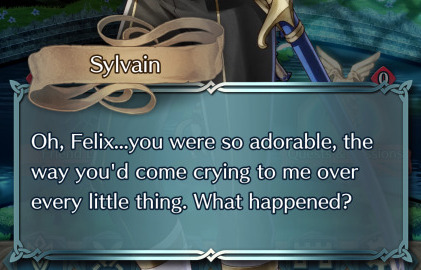
Sylvain: Hey Felix, you free? You must be free, right? Let's go flirt with some girls together today.
Felix: Tch… You're disturbing my training. Go by yourself.
Sylvain: Don't say that. Come on, we've known each other for a long time, haven't we?
The one change that bothered Sylvain more than any other was the change in Felix's personality. While he didn't like girls becoming attached to him, he was sad that Felix seemed to have outgrown that tendency and no longer wanted to spend time with him.
Felix: We've certainly known each other for a while, but that's about it. Besides, it's not what I wanted. It was just our parents' wishes.
Sylvain: So, you're saying it's a rotten relationship, huh?
The phrase "rotten relationship" is kinda hard to translate. It is "腐れ縁" (kusareen) in Japanese. It means "a relationship that cannot be severed even if one wants to." It's usually a relationship that has persisted for a long time, often against one's will or preference, because it is bound up in some work, social, or family obligation. It tends to have a negative connotation, implying that the relationship is undesirable or plagued by difficulties.
It was derived from "鎖縁" (kusari-en) or "chain relationship", a term that refers to a close and inseparable relationship between two people, often described as being bound together by chains. "Chain relationship" was a positive term referring to two people bound by fate, as if they were destined to be together. But over time, the "rotten" part was added, and it took on a negative connotation.
Felix: That boar prince, it's been a rotten relationship since birth… No, even before birth. That's why I'm warning you… He harbors a beast within. You can trust in his skill in combat and brute strength, but as a person, he's utterly untrustworthy. You better be careful not to be devoured yourself.
Felix used the exact same term when he warned Byleth about Dimitri in Chapter 2. And the way he described his relationship with Sylvain is actually a far more accurate description of his relationship with Dimitri. Felix did have fond memories of their childhood together, but Dimitri's sadistic smile while torturing the rebels was ingrained in his mind. After that, he no longer wanted to associate with him, but he couldn't break off their relationship due to his family.
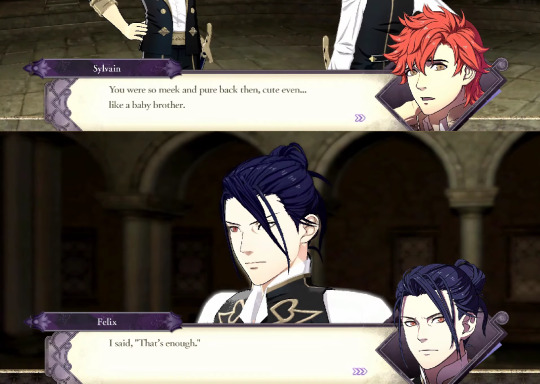
Sylvain: So, you're saying it's a rotten relationship, huh? Come on now, Felix. You used to cling to me like glue back in the day. You couldn't beat your brother, got into fights with His Highness, and every time something happened, you came crying to me. Back then, you were so meek and innocent. I doted on you like a little brother…
Felix: ...Enough.
Sylvain disagreed that his relationship with Felix was just a rotten relationship. The implication was that it was more of a chain relationship and Felix was trying to downplay how close they were because he was hurt by the way Sylvain was acting.
Felix: Listen. I've held back until now, but there are plenty of things I want to say to you. In your personal life and even on the battlefield, you're frivolous. Whenever something happens, it's always about women…
Sylvain: Hmm, what's wrong with that? It's rude to ignore cute girls…
Felix: There's a limit to that, you sex fiend. If your sword skills were solid, I could acknowledge that. But you slack off even in training… Do you not feel any guilt about hurting others' feelings and holding them back?
Sylvain's womanizing certainly hurt Felix's feelings, but he was even more hurt by his frivolousness in battle. The implication was that he had no choice but to double down on his training because he was always babysitting Sylvain on the battlefield.
Felix: Being in this military academy, one becomes speechless at the sheer number of fools who, indulged by the power of their Crests and the status of nobility, neglect their training. It's truly astounding.
(Best response): It would be good to give them training.
Felix's note to the advice box was undoubtedly written with a particular person in mind.
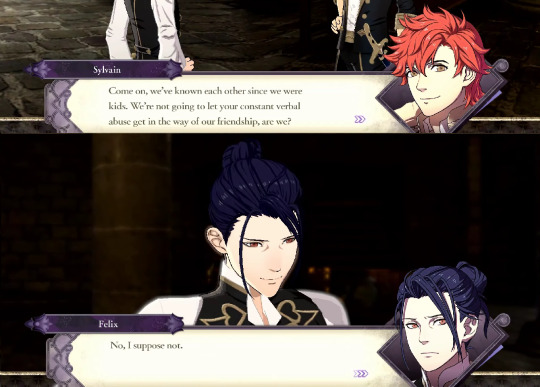
Sylvain: You know, since way back, I've been doing stupid things, and you've always been there to yell at me…
Felix: Both of us getting lectured by Ingrid because of you… Try to put yourself in my shoes, I got dragged into it every time.
Sylvain: Yeah yeah, that's right. Our relationship hasn't changed no matter how many years have passed. But you've changed, Felix. You were so adorable when we were kids… Now, you've become completely warped. I wonder why you grew up like this…
Felix: Tch… You, on the other hand, are still a good-for-nothing, just like in the past.
Sylvain: Ahahaha, what's that? Is that something the person who has always been by my side would say? Even now, look, you came all the way to me with the intention to apologize for what happened the other day, right?
Sylvain wasn't intimidated by Felix. But being yelled at by him still hurt his feelings and he kept his distance afterwards. And Felix came crawling back to him to apologize. He couldn't sever their relationship even if he was so hurt that he may have wanted to. He was afraid of losing their friendship, so it proves he was lying when he called it a rotten relationship.
Felix: …The boar prince and I have been acquainted since before birth. Before I knew it, he was always by my side… You might even say that, at one time, we were best friends.
Dimitri and Felix were always together as little kids and Felix used to whine unless they could do everything together. I've seen some people say that they were best friends up until the incident suppressing the rebellion when they were 14 or 15. But that didn't appear to be the case. At the time the Tragedy of Duscur occurred, when he was 13, Dimitri considered Glenn his best friend.
Sylvain: However, both His Majesty and Felix have really grown up, haven't they? Ten years ago, they were the kind of guys who would squabble over breaking each other's swords and whatnot…
Felix always went crying to Sylvain whenever he and Dimitri fought. Dimitri broke Felix's sword when they were nine years old. So, even by that age, Felix was clingier with Sylvain than Dimitri.
Sylvain: A little laziness is just right. If you push yourself too hard, you'll just get tired. Oh yeah, I'll treat you to a meal, so let's go out to town together, Felix.
Felix: No.
Sylvain: Which is more important, going to town with me or training?
Felix: Training. See ya.
Sylvain lamented how cute Felix used to be in Houses, Hopes, and even Heroes. He was the only male character that Sylvain was ever interested in spending time with one-on-one. He even invited him out to dinner like he did with girls. It is very likely that he was so sad about how much Felix changed because he used to be his ideal "girl".
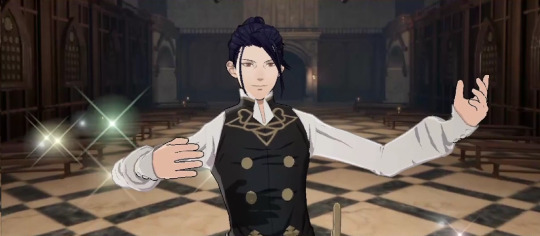
Sylvain: More importantly, it's time for the ballroom dance now, isn't it? There's also the White Heron Cup competition, right? So, Professor, who are we sending from our class?
(Byleth chooses Sylvain as the representative for the White Heron Cup)
Sylvain: Huh, me? Well, um, that's fine I guess. It's a good opportunity to show the girls what I can do.
(Byleth does NOT choose Sylvain as the representative for the White Heron Cup)
(Japanese) Sylvain: If anything, I'd rather see a beauty dancing than watch a bastard dancing, you know.
(English) Sylvain: I get it. No worries, really. I'd rather see a beautiful person dancing instead of some goof like me.
Sylvain lumped himself into the "yarou" category, too. He was eager to impress girls during the Battle of the Eagle and Lion. But he will sound a bit disappointed if you choose him as the White Heron Cup representative. He's happier if you choose a beauty. The term he used for a "beauty" was "美人" (bijin). It means "beautiful person," but it is primarily used to refer to beautiful women.
It can sometimes be used to describe an exceptionally attractive man, although less commonly. Generally, "bijin" is more commonly associated with feminine beauty in Japanese language and culture. While it can technically be used to describe individuals of any gender who are considered beautiful, the term often carries connotations of traditional or stereotypical feminine beauty standards.
And since "yarou" is gendered, you'd think that "beautiful woman" would be the obvious way to translate that line, right? But I have to give the localizers credit where credit is due. They used "beautiful person" rather than "beautiful woman". Because they knew Sylvain would not have minded one bit if Felix had been the White Heron Cup representative.
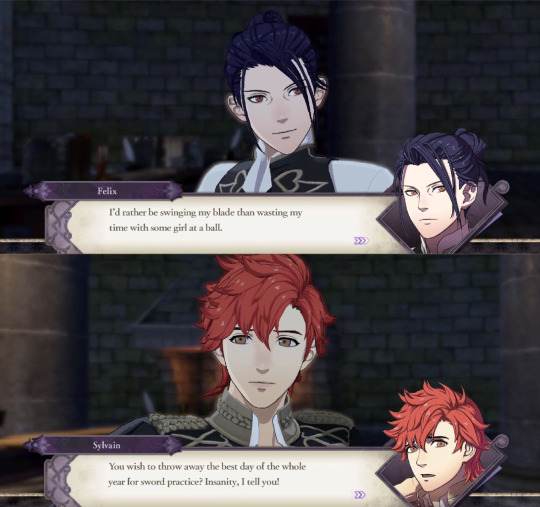
Felix: You seem like you have something to say. …You're not seriously considering choosing me as the representative for the White Heron Cup, are you?
(Byleth does NOT choose Felix as the representative for the White Heron Cup)
Felix: I see. That's fine then.
Felix is unsociable. He gets annoyed if Byleth stares at him too long during teatime and he struggles to maintain eye contact when talking to people. Yet he was not as opposed to participating in a dance contest as you'd expect. He even brought it up himself. If you don't pick him, he doesn't sound relieved like most of the others. In fact, in Japanese, I'd say he sounds a tiny bit disappointed. His objection seemed to be dancing with a girl, not dancing in general.
Felix: I'd much rather swing a sword at the training grounds than dance with a girl at the ball.
Sylvain: Huh? Your Highness and Felix, are you joking…? You can dance with all the girls in the school. Do you mean to say that on such a wonderful day, you'll be practicing swordplay with each other…? That doesn't seem like a sane idea!
One the "Night of Promises", Dimitri was not looking forward to the ball because he was sad that he was never going to rekindle his spark with Edelgard. He still attends the ball, and the cutscene shows him dancing next to Edelgard, as if to imply that he wished he was dancing with her instead of the girl he was actually dancing with. Felix felt the same way as Dimitri. He said he was going to skip out and train instead, something that made Sylvain sad. He used the word "yarou" once again here, emphasizing the masculine nature of the activity he's criticizing.
Felix: But… to the casual observer, it might not look entirely unlike a tryst between a man and a woman. If you're truly dissatisfied, then that's your compromise.
Byleth: Unfriendly.
Felix: Call it whatever you want. I'm about to head back to the training grounds.
If Byleth meets Felix at the Goddess Tower, his dialogue indicated that he did indeed skip the ball to practice at the training grounds.

Sylvain: When I heard you were heading to the Goddess Tower, I wondered who you were having a tryst with… I never expected you'd just be standing there alone, lost in thought.
Byleth: Tryst...?
Sylvain: Wait a minute. Seriously, what's going on? When someone goes to the Goddess Tower, isn't it to meet a lover? Here, vows exchanged are sure to be fulfilled… It's the lovers' sanctuary, you know.
(Option 1) Byleth: Why did you come alone?
Sylvain: Huh? Oh, well... Truth be told, I was curious about who you were waiting for. I hurried to catch up, only to find you alone in the end... Well, I must say, it put my mind at ease.
Sylvain goes to the Goddess Tower simply because he was curious about who Byleth was waiting for and was relieved to find out that she was alone. Then afterwards, he offers to make a vow with her.
(Option 2) Byleth: Don't you need to invite a female student?
Sylvain: That's true. I could have invited someone, but my true love is right in front of me. Being alone at the Goddess Tower means I can try to woo you, right?
The phrase Sylvain used for "true love" was "本命の相手" (honmei no aite). "本命の" (honmei no) translates to "main," or "primary". "相手" (aite) translates to "partner" or "opponent," depending on the context. The phrase typically refers to the person that the individual truly loves or considers as their most significant romantic interest.
HOWEVER. It also translates as "favorite opponent" in specific contexts, particularly in sports or competitive activities where "aite" means "opponent" or "rival." In that context, it refers to the most formidable opponent in a competition or match, the one whom the athlete or team considers their top rival or challenger.
Byleth: …Me?
Sylvain: Yes. Who else would I be talking about?
Who else would he be talking about? Well maybe someone who spends a lot of time with Byleth as a sparring partner? Someone who was absent from the ball? Perhaps someone he made a promise together with in the past?
Sylvain: Hey, Professor, I won't make you unhappy. So, how about getting married…
Byleth: You're not trustworthy.
Sylvain: Haha, well, that's true.
Sooo. Why did Sylvain go to the Goddess Tower? Was Byleth his true love? Or was she actually his primary rival for his true love? Well, I think we can rule out the "true love" option.

Felix: This is troublesome… The enemy is just a bunch of thieves. I doubt there are any skilled fighters among them.
Sylvain: Don't be so cold. I'm looking forward to it. Come on, there might be a beautiful female thief among them.
Felix was always trying to prove his worth in battle. And Sylvain was always goofing off because he didn't value his own life. Before the group's first battle against bandits in Houses, he wasn't acting serious because there would most likely not be skilled fighters among them. He even made a joke about flirting with one of them.
Felix: If they're in a state of confusion right now, we can easily round them all up. I'm on my way.
Sylvain: …No, no, no, hold on a second. Don't you think there's something strange about that fortress?
In Hopes, the bandits were a much greater threat than they anticipated, and Sylvain completely changed his tune. You gain Support points with Felix if you suggest charging the fort. But you gain points with Sylvain if you suggest a more cautious approach.
Sylvain: Ah, I thought since it's a festival day, there wouldn't be any lectures, and we could play all day… Hey, Professor. Even if you were planning an assassination, would you really choose the day of the Rite of Rebirth for it? I feel like there might be times when security is less tight. Or is there a reason it has to be this day?
Before the Rite of Rebirth, there was an assassination attempt on Lady Rhea. Sylvain didn't take it seriously because he knew the monastery's security would be tighter than ever on that day, and he was just goofing off and chatting up Hilda.
Sylvain: …But it's strangely quiet these days. Is it because the knights are out and about?
Felix: I heard the knights are putting all their effort into tracking down the enemy.
Sylvain: Putting all their effort… Isn't that a bit too much? Is it okay to neglect the monastery's defense?
Felix: …How do you see this situation?
Byleth: Maybe you're worrying too much.
Sylvain: Is that so… Well, I hope the knights come back soon.
But after Jeralt was killed by intruders, he was standing with Felix, worrying about the thin security with all the knights out looking for the enemy. It's a very nice bit of subtle storytelling, showing that, even if he seemed like he was always goofing off, he was serious about Felix's safety and always kept an eye on him.
Sylvain: Come to think of it, you don't like sweets, huh? Well, thanks. I'll eat it later. …So, what do you want me to do? Ah, you want me to play matchmaker with a girl?
Felix: Is your head filled with sugar or something? I'm just here to thank you for the battle the other day. If you hadn't noticed the ambush, I would probably be dead by now.
Sylvain: Oh, right... But isn't that just how it goes? On the battlefield, it's all about mutual support. That's what comrades do, right?
Felix: …You haven't changed a bit.
Sylvain: Yeah, I'm still the same as ever.
Felix: You always…
Felix is the only partner who will confess their feelings for Sylvain at the end of the Support chain. You could tell that he was mulling it over in the A-Support. He even brought a gift of sweets for Sylvain before he planned to tell him how he felt. But he chickened out. Still, he was going to say that he was grateful to Sylvain for always protecting him ever since they were kids.
Sylvain: His Majesty or Felix would probably make better hunting partners than me. I prefer to just sit back and watch.
While there are no specific childhood anecdotes related to this, a comment Sylvain made during his Hopes expedition did imply that he occasionally accompanied Dimitri and Felix on their hunting trips.
Felix: Boars are naturally wary animals, but this one seems injured… If it senses us, it'll charge. We can't afford to get injured by its massive rush.
Raphael: Huh? Felix, you sound like you've fought something like this before?
Felix: It's a story from many years ago, but I once let a similar quarry slip away. [...] House Blaiddyd and House Fraldarius used to go on hunting trips together. On one trip, a certain prince killed so many deer it proved impossible to fit them all on the sled. Meanwhile, I went off hunting on my own, encountered the boar, and barely escaped with my life.
Felix had a near-death encounter with a wild boar as a child. And I strongly suspect that Sylvain was the one who saved his life and got pretty hurt in the process.
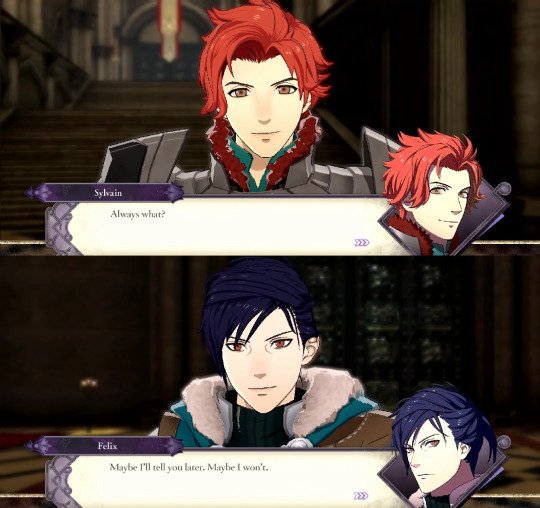
Felix: You've always been like this since we were kids. Normally so unreliable, but you've always thrown yourself in harm's way and helped us when it really counted. …Every time you managed to put on that carefree smile for us, I cannot deny that I wanted to hug you a little.
Sylvain: O-Oh… You're the one spouting those kinds of lines? Have you eaten something strange?
Felix: Tch… I won't say it again, you fool! Now that I know you're safe, I'm going back to my room.
In the A+ Support, Felix will finally say what he was thinking back in the A-Support. He will mention how Sylvain would literally put his body on the line and then smile afterwards. And Sylvain told Marianne that a smile was the true measure of a person's worth. He always smiled because it made him feel strong.
Felix uses the word "抱いていた" (dakishiteita). It means "embrace" or "hold." It can mean to literally hold, hug, or embrace someone in a physical sense. Or it can be used metaphorically to express the idea of cherishing or harboring a feeling of admiration or longing. But the writers probably chose that word for its dual meaning.
Felix was certainly trying to communicate his admiration for Sylvain's ability to smile even when he's hurt and in a lot of pain. And in doing so, he made his intense longing for Sylvain clear. And I do not think the localizers were wrong to have Felix express his desire to hug Sylvain in a literal sense. It was all part of the same package.
Sylvain: Alright, alright. Then I'll wait while having a meal until you feel like it. Come on, Felix, let's grab a meal in town. I'll treat you. How about some meat?
Felix: …Alright. I owe you one. Just for today, I'll go along.
Sylvain: After we fill our stomachs, then we can go chat up some girls…
Felix: ……….
Sylvain: Just kidding, jeez, you're really short-tempered. Come on, let's go together, Felix!
Sylvain offered to treat Felix to dinner in their B-Support, and he got rejected. In the A-Support, he offered again, and Felix agreed because he owed him. Now, Sylvain offered to treat Byleth—even the male—to dinner in his Paralogue because he saved his life, and he owed him. So, that probably wasn't what he wanted to hear.
In Sylvain's mind, relationships were always transactional, and he was very suspicious over whether anyone really wanted to spend time with him. He even suspected that Felix came to give him the sweets just so he could set him up with a girl. So, he apparently tested Felix's intentions by suggesting they chat up girls afterward. Ya know, just to make sure they're on the same page and it's really a date. In light of what Felix intended to say, it's clear why he was upset.
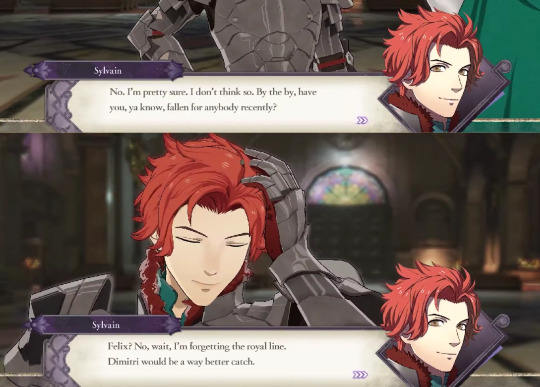
Sylvain: ...Hey, uh, Ingrid. Training again today?
Ingrid: No, today I'm going to the city to buy supplies. Training comes afterward. Is there something wrong?
Sylvain: N-no, you're still as serious as ever, huh? Some things never change.
Ingrid: …What are you talking about? I haven't changed at all.
Sylvain: Y-yeah, you're right, haha.
Ingrid: …Hey, what's up, Sylvain? Did you eat something strange?
Sylvain: N-no, it's not that. Um… Have you found someone you like?
Sylvain was always smooth whenever he was flirting with girls. But in his A+ Support with Ingrid, he was incredibly flustered and stumbling over his words. He's a completely different person when he's really fallen for someone. Taken at face-value, the player would assume that he has fallen for Ingrid. And while that is certainly a valid interpretation, it actually isn't the only interpretation. He was particularly worried that she had been training a lot lately.
Sylvain: No, it's not like I'm flustered or anything. …I was just a little curious about the reason, that's all.
Ingrid: …The reason for the makeup, huh. What do you think it is?
Sylvain: Well… Is it because of a guy? If we're talking about someone you might like, going by your past tendencies… Felix…No, His Highness is also a possibility.
And the first person he asked about was Felix, due to Ingrid's history with Glenn and how Felix had changed to be more like him. But was it because he was afraid Felix would steal Ingrid from him? Or was he afraid Ingrid would steal Felix from him? While many people consider Ingrid the "canon" love interest for Sylvain, they deliberately left their A+ Support open to interpretation. I have no doubt that the writers preferred Felix as Sylvain's love interest, but they didn't want to make a gay pairing too obvious, so they left it open for Ingrid, too.
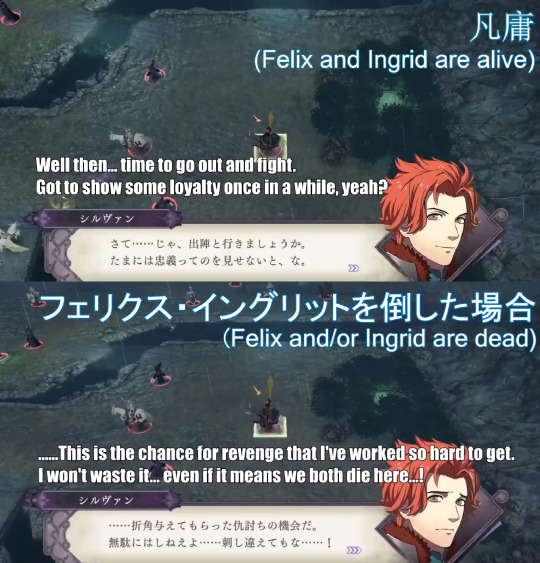
Sylvain: I've been given the opportunity for revenge. I won't waste it… even if it means stabbing each other to death…!
Regardless of which one you interpret as his love interest, Ingrid and Felix were the two most important people to Sylvain. If you do not recruit them in CF, they will die at Arianrhod, and Sylvain's dialogue changes in response during "Field of Revenge". The Japanese verb he uses "刺し違える" (sashichigaeru) literally refers to stabbing one another and killing each other.
Sylvain: Professor! Has it really been five years? We ought to raise a glass to the occasion. Celebrate your return. Nah, I'd rather commemorate it with your death.
Sylvain's CF arc is very interesting. He becomes like Miklan. The foreshadowing in his B-Support with Byleth was intended for this exact moment. He was so jealous of Byleth's ability to live freely that he wanted to kill them. And now he gets the chance. He doesn't care if he dies as long as he gets his revenge for his two friends. Sylvain felt like his parents only valued him for his Crest and his brother wanted him dead. But those two really loved him. He was so driven to kill Byleth in CF because s/he took everything from him.
Mercedes: You can't choose where you're born. It's like flowers not being able to choose where they bloom. Since we don't suffer from hunger or thirst, we can't complain even if the place is cramped. It's the same for both of us… We all have to bloom where we're planted.
Sylvain: It's true that flowers can't choose where to bloom. They can't go where they want to go until they die, and if the environment is bad, they will just wither away.
Because of the arranged marriage looming over his head, Sylvain felt like a flower with his roots firmly planted. He didn't feel like he could go where he wanted to go until he died.
Sylvain: Finally… I can go to the place where they are… I'm sorry, Your Majesty… I… will go ahead and wait…
Dimitri: Thank you, Sylvain. I will also… definitely go to where you all are.
And where did he want to go? To the place where Ingrid and Felix were. CF!Sylvain was relieved that he could finally join them upon his death, something that was sadly not included in the localized version. That line was especially relevant to his relationship with Felix because they promised to die together.
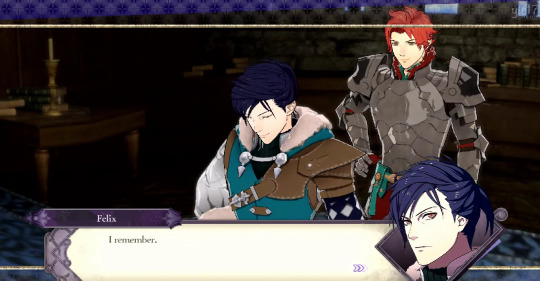
Sylvain: Me… disliking girls? Hahaha, no way, no way, not at all! I'm always serious when it comes to girls. I put my life on the line to woo them.
Dorothea: You should focus on one person and then say that. You only have one life, and usually, there's only one person you can love enough to stake your whole life on.
Sylvain has the fewest number of paired endings out of any student. Understandably, very few women would consider marrying him. Mercedes would in order to escape her arranged marriage, but she'd have to give up her dream. And Ingrid would because she loved him and thought she needed to take care of him or else he'd end up like Glenn. But she'd also have to give up her dream.
In his S-Support proposal, Byleth was not quite sure if Sylvain was being sincere because he was still using shallow words. And Dorothea did not trust him, either, because he had to propose to her at least ten times. And of course, Dorothea will marry pretty much any nobleman in the game to secure her future. Felix had no one pressuring him and nothing to gain from being with Sylvain.
Sylvain: Do you remember? We made a promise when we were kids. That we'd die together.
Felix: ...I remember.
Sylvain: So, you see, there's no way I'd die before you and leave you behind.
In English, "dying together" could be taken as platonic. Just brothers-in-arms or best friends. However, there's a cultural nuance to it in Japanese because that phrase is often used in a romantic context. It implies that they will not just die but spend their whole lives together. It was, in essence, a marriage proposal.
Felix: …Well, I suppose that's true. But I'm fed up with getting terrified like this. You shouldn't just fool around all the time. Take your training seriously for once. …If you end up carelessly throwing your life away, I won't be able to die with you.
Sylvain: Yeah, you're right. Once I'm healed, I'll try to be a bit more serious.
Felix uses the phrase "肝を冷やす" (kimo-o-hiyasu). It's an expression that literally translates to "cooling the liver" but figuratively means "to be frightened" or "to be scared stiff." It refers to the feeling of fear or nervousness that causes a person's body temperature to drop, often likened to a sensation of chilling one's liver.
Their entire Support chain was about how Felix never really changed. He always prioritized his training over hanging out because he was absolutely terrified that Sylvain would get himself killed and they wouldn't have a future together. After finally realizing this, Sylvain reaffirmed his childhood promise. He no longer wanted to die.
Sylvain: Anyway, I suppose you just said the things I usually say, right? Even if it's the same pick-up line, serious guys' words are taken seriously.
When Felix said Sylvain was frivolous in their C-Support, he used the word "不真面目" (fumajime). When Sylvain said he'd be more serious from now on, he used the word "真面目" (majime), which is the opposite. He also used this word in his Support with Dimitri. It means "serious" or "earnest" in English. It describes someone who is diligent, takes things seriously, and is sincere.
The "Sincerest of Knights" was not just saying that he would take his training seriously. He was also saying that he would take his personal life seriously. He wouldn't be frivolously going around picking up girls and telling them he loves them enough to stake his life on them anymore. Because he already found the one.

Sylvain: These five years, fighting and fighting… Finally, the tough times have come to an end. A new era is about to begin. …So, I thought it's about time I put an end to my own fate.
Byleth: Put an end to?
Sylvain: Yes. My fate is not determined by something like a Crest; it's determined by me… This is the first step towards that. Not someone trying to use my Crest, not someone decided by someone else, and not just a playmate…
Death is the arcana of transformation and typically refers to a need to start over by letting go of the past. It is about moving forward from outworn and outgrown ways of life. And that's what Sylvain's character arc was all about, regardless of whether he marries Byleth.
The term for "put an end to" is "けじめ" (kejime). It can be translated as "closure," "settling accounts," "bringing something to an end," or "establishing a clear boundary." It suggests that Sylvain is finally ready to confront his fear, establish firm boundaries with his father, and decide for himself who he forms intimate relationships with.
Sylvain: But our feet aren't roots. We can move ourselves and go where we want. If we navigate cleverly, we might not have to give up what we want to do. [...] I'm not trying to court you or anything like that. But if I, as the legitimate son of Gautier, were to propose to you… The other party would have no choice but to withdraw. It might sour our relations a bit, though. Afterward, you can do as you please. You can work at the church or become whatever you want.
Mercedes: But if you did that, Sylvain, you wouldn't be able to marry the person you love, right?
Sylvain: Hahaha, I'm not being serious about that.
Sylvain is a Gemini. Being the Twins, they'll flit from person to person to see what everyone has to offer, but once they commit, their lives are complete and whole. Because he and Felix made such a promise before the game even started, it suggests that they were both in love with each other, regardless of whether you go for their paired ending.
And if Sylvain already had someone that he wanted to spend his life with, but that he wasn't free to do so because they were the wrong gender to produce heirs, then it paints his behavior in a different light. His storyline was about forbidden love. He changes his behavior in Hopes because he realizes that he can go where he wants and doesn't have to give up on being with the person he loves.

Felix: I was raised to value strength above all else. Whereas you had a reason, an ambition, pushing you toward that hunger. So, tell me. What was the reason? Why were you driven to become so strong?
Not only is Sylvix the best relationship for Sylvain's growth, but it is also the best relationship for Felix's too. Felix was also a victim of Faerghus's patriarchal culture. He was taught to swing a sword before he could write and was raised with the motto: "Grow strong so you may live, and live to grow stronger".
Felix: It's like training with my brother. He always won—always—and died before I could win a single bout. From the first time I held a sword, all I wanted was to surpass him. And that's what drove me to become so strong.
Since Felix was a child, his main ambition in life was to surpass his brother, who he always lost to while sparring. And that sense of purpose continued to subconsciously drive him, even nine whole years after he died.
Rodrigue: …My eldest son was quite outstanding, you know. He was knighted at the age of fifteen.
Glenn possessed exceptional swordsmanship ability. Felix was probably so obsessed with surpassing his brother at swordplay because he was trying to earn the admiration of his father.
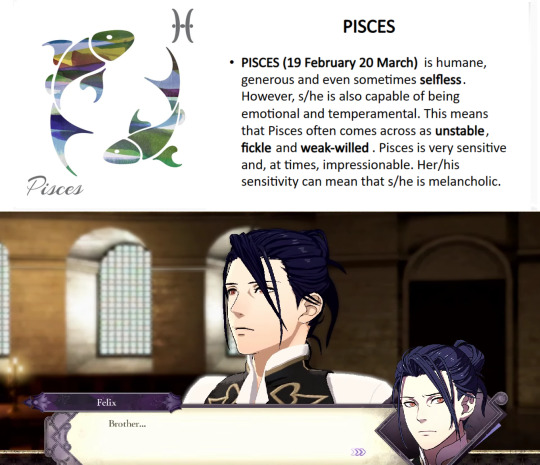
Felix: Sorry, but I'm not "Emile." And of course, I'm not your brother. Tch… It's so annoying being compared to someone else.
Mercedes: I'm really sorry… I'll be on my way then. …Oh, the tea refill is here. Please help yourself if you'd like. …Well, see you.
Felix: …I am me. Regardless of what anyone says, I'm not anyone else. …Isn't that right…Brother.
The English localization changed several lines in Felix's C-Support with Mercedes, giving it a slightly different meaning than the original Japanese version. The verb used by Felix is "重ねる" (kasaneru). It means "to pile up" or "to layer". Metaphorically, in this context, it conveys the concept of overlapping an image of one person with someone else, because they remind you of them. The Japanese version made it sound like "You're you, not anyone else" was something Glenn had to remind Felix often.
Shez: Is Dimitri really that much like his dad?
Rodrigue: Oh, yes, absolutely. Well, the late King was a bit more hot-headed, it seems… Compared to me and my son, they are spitting images of each other. See, we don't resemble each other much.
Shez: Yeah, you're really not very similar at all. Your looks aside, of course.
The concept of "kasaneru" played into Rodrigue's relationship with both of his sons. He had trouble viewing them as their own people, rather than just reflections of himself. He was very proud that Glenn took after him and disappointed that Felix did not. He also projected his own feelings onto Glenn. While it did seem like he chose to defend Dimitri to the death, he was not satisfied to die.
Felix: …Hmph. It's a waste to keep someone like you as a woman.
Leonie: Oh, come on. That's what's wrong with you. Strength has nothing to do with gender. It's because you underestimate your opponent that you fall into traps.
Felix: …Yeah, you're right.
I've seen some people accuse Felix of being a misogynist because of several comments he made to female characters. One comment was to Ingrid about finding a husband, which I'll get to later. Another was his comment to Leonie about being impressive "for a girl". His comment in Japanese is actually entirely different. He was saying that Leonie is so strong that it's a waste because strength isn't a trait that is appreciated or expected of females in Fódlan.
Felix was implying that her talents might be better suited for manhood. And she actually made him question that way of thinking. This Support showed how Felix was aware that some people don't naturally conform traditional gender roles and it would make their lives much easier if they were the opposite sex. Which is something he had undoubtedly thought about himself.
Felix: It's all well and good to remember the dead, but sentimentality will get you killed. All the tears in the world couldn't bring them back, after all.
Ingrid: You have always viewed the world in such stark terms. It might even be one of your strengths. But one day, you will learn that emotions and sentimentality are also a strength, not a curse.
Felix is a Pisces, which is considered one of the most feminine signs of the zodiac due to its association with sensitivity, intuition, empathy, and creativity. Pisceans are often described as dreamy, compassionate, and deeply empathetic individuals who are attuned to the emotions and needs of others. As a child, Felix was meek, innocent, clingy, and would cry easily. These are stereotypically feminine traits which would certainly not be valued in a strength-obsessed culture like Faerghus. And especially not in a boy.
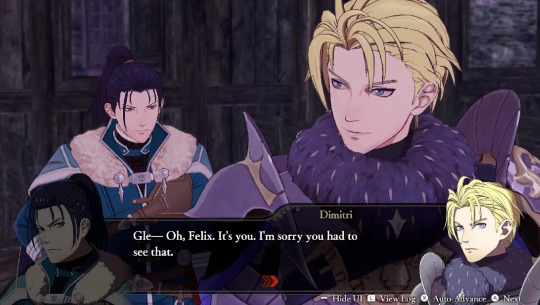
Felix: I am tired of it. For years, I've been forced to be a "replacement" for the dead. I had an excellent brother. He was a splendid knight worthy of admiration… He's dead now. After my brother's death, his presence haunted me like a shadow.
The Mother Goddess archetype is a powerful and ancient symbol found in various cultures and mythologies around the world. It represents the qualities of nurturing, fertility, protection, wisdom, and interconnectedness. Some examples are Isis from ancient Egyptian mythology and Mother Mary in Christianity. Sothis was the embodiment of the divine feminine principle.
The one who embodied the divine masculine principle was Nemesis. He represented the Warrior Hero archetype, which embodies qualities such as courage, strength, and valor. Figures like Achilles in Greek mythology, King Arthur in Arthurian legends, and Beowulf in Anglo-Saxon literature exemplify the ideals of the Warrior Hero.
Despite being the most religious country, the actual values of Faerghus were much more aligned with the Warrior Hero than the Mother Goddess. The Crest of Fraldarius is associated with the Emperor arcana. It represents the divine masculine principle. As the replacement heir, Felix's patriarchal duty was to serve as the king's sword and shield. But he hated the ideals of chivalry.
Dimitri: Heh. You know, Felix, you really are growing more and more like your brother. Always so sarcastic, and constantly looking for a fight. But deep inside, more than anyone, you—
The concept of "kasaneru" factored into Dimitri and Felix's relationship as well. Felix's gruff personality was not the natural effect of puberty. It was the result of being forced into a role he wasn't suited for. He hated bloodshed. His first battle left him horrified and he needed to desensitize himself to cope. After losing his brother and becoming a squire, his naturally sentimental and meek personality changed to become more like his brother, "sarcastic and constantly looking for a fight". Stereotypically masculine traits.
Bernadetta: Felix, did you just smile? And it was a really big smile, right? Hehehe, it's like cracking open a tough nut and finding a sweet smile inside…
Felix: Tch… Don't get cocky, silly girl.
Bernadetta: Oh no, the shell closed!
Felix: …You've got guts to tease me like that. Seems like you really want to get in trouble.
The word Bernadetta used was "甘い" (amai). It is used for "sweet" and, just like in English, is often used to describe something that is sweet in taste or metaphorically sweet in demeanor or expression. In Japan, sweets are culturally coded as childish and feminine and liking meat is considered masculine. Did Felix truly not like sweets? Or did he just avoid them because of how they are perceived?
Bernadetta: Felix, please try this. This candy has a reputation for not being sweet.
(Normal) Felix: I refuse. Whether it's sweet or not, I don't like candy.
(Felix & Lysithea support level B reached) Felix: Candy, huh... If you say it's not sweet, should I take some?
It's worth noting that Felix will refuse to eat unsweet candy that Bernadetta offers him in their A+ Support. But he will actually give the candy a try if he has reached B-Support with Lysithea, after he tries her cake. And in their paired ending, he gives up the sword to spend to his life baking sweets with her. So, it suggests that he was just concerned with keeping up appearances.
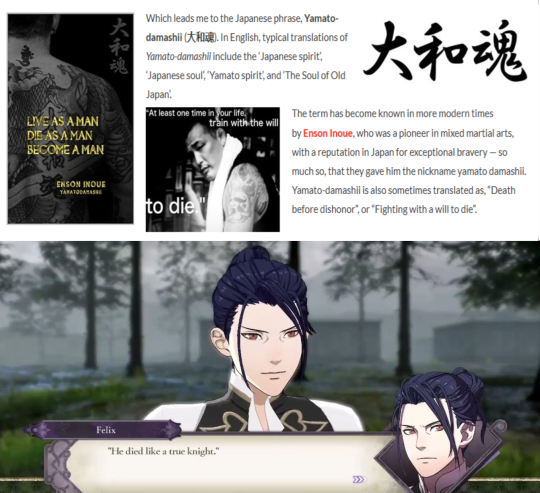
Felix: If I were to die here, would you say something like you did when it was my brother? "That's the true end for a knight."
During World War II, ultra-nationalists popularized Yamato Nadeshiko as the female manifestation of Yamato Damashii. It is the term for an idealized Japanese man and refers to the traditional virtues and characteristics associated with him. These include loyalty, courage, honor, selflessness, and a strong sense of duty. This concept is deeply rooted in Japanese culture and history, reflecting the values upheld by the samurai class and other historical figures.
Dimitri: My closest friend was a knight who served the royal family. He was near to my own age, and I admired him greatly. But one day, I watched him die. He stood his ground and fought bravely, but his life was snuffed out in the blink of an eye all the same.
Ingrid: I always looked up to Glenn. He was the very picture of a perfect knight—noble and virtuous. In the end, he laid down his life—the ultimate sacrifice. I feel proud of him in ways that words can't quantify.
Rodrigue: To this day, I'm proud of Glenn. He gave his life to protect Prince Dimitri. If he had abandoned His Highness and fled, I don't know that I could have forgiven him… I would have been deeply ashamed.
Glenn was less a character and more an archetype. He represented the ideal man of Faerghus that Felix was supposed to aspire to be. Since he was a child, his purpose in life was getting strong enough to beat Glenn at sparring. He felt like he would only be valued if he became more like his brother. And after the Tragedy of Duscur, he felt like his father would only value him if he died.
Sylvain: The old Felix was really adorable, but what happened to make him like that?
(Best Answer): Say it's part of growing up.
Whenever Felix lost to Glenn at sparring, he would go crying to Sylvain. It is likely that Sylvain was the one person, other than Glenn, who made Felix feel appreciated for who he really was. Rodrigue, Dimitri, and Ingrid always talked about how admirable Glenn was. Sylvain always talked about how adorable Felix was and was sad about how he had changed. After losing his brother, Felix probably felt like his purpose in life was keeping his promise with Sylvain.
(If Byleth is male)
Felix: Having heard of your skills, I'm eager to meet you in battle. Come to the training ground later. There, you will show me what you're capable of.
Regardless of gender, Felix viewed Byleth as his personal rival, just like he did with Glenn when he was a kid.
(If Byleth is female)
Sylvain: Such benevolence is a sight to behold! I don't suppose you would care to join me for tea? We could discuss education…and marriage.
Felix: Control yourself, Sylvain. I have more important matters to discuss with our new professor. Come to the training ground later. There, you will show me what you're capable of.
Although, interestingly, it was Sylvain's marriage proposal that prompted him to challenge Female Byleth to a sparring match when she first became Professor.

Felix: …What. I thought it might be someone else, but it's you.
Byleth: Meeting someone?
Felix: I didn't have such plans. …I just wanted to come to a quiet place.
Felix skipped the ball. But he was already at the Goddess Tower when Byleth arrived. He said he just needed some quiet, but wouldn't the training grounds already be quiet on the night of the ball? In Japanese, it's clearer that he was actually expecting someone else instead of her. There's only one person he could possibly have had in mind. The person he made a promise with long ago.
Felix: You know the legend of the Goddess Tower, don't you? The one where vows always come true. It's so absurd it makes me feel like vomiting…but trying to believe in it might be amusing. Let's make a vow to the Goddess of Fódlan. I will… I will, someday, surpass you. I'll surpass your sword, your skills, and as a warrior, I'll defeat you.
Most of the students used the word "約束" (yakusoku) when referring to the legend. It means "promise". There were only a few who used the word "誓い" (chikai). "Chikai" conveys a stronger sense of commitment and means "oath" or "vow". It often involves a pledge made with deep sincerity and seriousness.
"Chikai" tends to carry a more profound emotional and moral weight than "yakusoku". Byleth rejected Sylvain's request to exchange vows. And her vow with Felix was quite unromantic. Before swearing his vow, Felix closed his eyes, which he also does in his A+ Support when he remembers his promise with Sylvain.
Byleth: What kind of vow is that?
Felix: What, unsatisfied? If you're looking for a romantic relationship, I'm sorry, but hit up some other man. Unfortunately, I've lived a life devoid of such things. Blades, blood, and battles. That's all I am.
Felix wasn't disinterested in love. He was disillusioned with love. After feeling unloved by his father and cheated on by Sylvain, he was trying to fill the void of love with strength. The only way he knew how to prove his worth to himself was on the battlefield. And that was the only sense of purpose he had left in life, anyway.

Felix: Once I decided to fight alongside you and the emperor, I was prepared. …Prepared to abandon my country, to strike down my father, and to kill a man I once called a friend. But… my sword feels a bit heavy.
I found Felix's character arc in CF very interesting due to the whole "rotten relationships" idea. Remember how it means "a bad relationship that cannot be cut even if you try"?
Dimitri: Felix… You killed Rodrigue… your own father.
Felix: I decided to cut down anyone who stood in my way. Even if it's my own father… Even if it's a friend I spent my childhood with.
Dimitri: I see. After this exchange… I have finally resolved to kill you.
When it came down to literally cutting Dimitri out of his life, CF!Felix was very hesitant. He had a sad expression during this dialogue. And it was the same when he fought Ingrid.
Sylvain: Hey, Felix… Remember back when we were kids? We promised we'd die together, didn't we?
Felix: ...Yeah, I remember.
Sylvain: So… Now, it's gonna be you and me, killing each other.
Felix: …Sorry, Sylvain. I'm gonna have to let you die first.
However, he showed absolutely NO hesitation killing Sylvain. In fact, he was even colder to him than he was to Rodrigue. Sylvain was clearly the real target of Felix's revenge in this chapter, not the boar. When Ingrid warned Sylvain that he was going to get stabbed if he kept cheating, it was probably foreshadowing for this moment.
Sylvain did not take CF!Ingrid's disloyalty personally and was not angry at her. He was just happy that her stubbornness hadn't changed. But he was very angry at CF!Felix. It was the betrayal he wanted revenge for. He specifically brought up their promise before expressing his desire to fight to the death. He was fully prepared to be stabbed to death, but he wanted to take Felix with him.

Rodrigue: Hmm. The dreams I held dear as a child have either already come true…or never will.
The Hero's Relic of House Fraldarius is the Aegis Shield, a reference to Greek mythology. It's likely no coincidence that Rodrigue's middle name is "Achille". He was probably inspired by Achilles, the warrior hero from the Iliad. Achilles' strong reaction to his childhood companion Patroclus' death is often taken as a sign that their relationship was possibly deeper than friendship. He lamented, "My dear comrade Patroclus has fallen—he whom I valued more than all others, and loved as dearly as my own life? I have lost him."
Rodrigue: No matter how much we grieve, the dead won't return. There's no way for them to hear our words. That's why their presence binds those living in the present like a curse. The more we cherished them, the more we become entangled and suffer… I'm not strong enough to scold His Highness for his foolishness.
Byleth: Even so…
Rodrigue: Yes. It seems scolding and getting them back on their feet is our duty as adults, isn't it? …Despite speaking so arrogantly, in the end, I am unfit to be an adult, aren't I?
When I first played AM and got to the scene called "Entrusting the Future", I assumed Rodrigue was still talking about Glenn when he lamented how the dead can't return.
Rodrigue: We both have a disposition where we can't just live without purpose. Both Felix and me. I lived to serve him, the late King Lambert… to support him as his right hand. Having lost the king I should serve, having lost the purpose of my life… I thought about what I should live for… And in the end, I made fulfilling our promise my new purpose.
Shez: A promise… What was the promise about?
Rodrigue: He asked me to admonish and correct his child if he ever strayed from the right path.
But after playing AG, there was another scene called "Entrusting the Future". And I realized he was actually talking about Lambert all along, not Glenn. AM!Rodrigue understood why Felix hated him for his comment about Glenn's death and he didn't blame him.
Dimitri: Every time I see the expression of longing on your face when you remember my father, there's always a thought that crosses my mind. I wonder if you wished to live and die alongside him.
Rodrigue: …Haha, you're overthinking it, Your Majesty. Despite appearances, I consider myself quite resilient. No, I didn't wish for my own death when Lambert passed. However… if it were to fulfill a promise with him, I believe I'd be satisfied to die.
The concept of "kasaneru" played a large role in Rodrigue's relationship with Dimitri. It was very telling that he decided that his new reason to live was not to help his surviving son get back on his feet, but instead keeping his promise to Lambert. Dimitri had strayed from the right path, but Rodrigue could not scold him. In VW, this enabling caused Dimitri to throw everyone's lives away at Gronder Field. In AM, when the consequences of Dimitri's actions came back to bite him, Rodrigue took the punishment on himself, stating how there are no sins or punishments on the battlefield.
Rodrigue: He left home on his own, and now… this foolish son of mine.
Felix: I have no intention of returning to you. Nor do I have any intention of returning to that boar.
Rodrigue: …When a child misbehaves, it's the parent's responsibility. Felix… right here and now, you'll die!
Yet Rodrigue said he would not have forgiven Glenn if he had run away at Duscur. He could not even forgive his own teenage son for an act of cowardice on the battlefield. And if Felix joins CF, he has absolutely NO problems punishing him with death. I could understand and empathize with Rodrigue more after playing AG. I don't think he was a bad person. But he was certainly a bad father. He valued Lambert's (and Dimitri's) life above all others, even his own. And even his own sons. And Felix could pick up on that.

Felix: So, the old man's dead…
Dimitri: Yes.
Felix: I'll cut you down. Prepare yourself, you damn boar!
Dimitri: Very well. Come at me, Felix!
There is unused dialogue that was apparently meant to be an alternate scenario based on whether Felix was defeated in Part 1 and was unrecruited in Part 2. I suspect much of his vitriol towards Dimitri in AM stemmed from jealousy over his father's affection. And because of him, he lost the chance to ever make up with his father. Their AM battle dialogue is the opposite of CF. This Felix had no hesitation cutting Dimitri out of his life violently and was prepared to die with him.
Felix: Sylvain, stand aside. My blade thirsts for his blood, not yours.
Sylvain: Then surrender already. I don't want to fight you, either!
Felix: …Sorry. That isn't up for discussion.
But he had no desire to fight Sylvain. Because they could not finish their Support chain, Felix could not reaffirm his promise and find a new reason to live. I'm sure Sylvain knew that he was throwing his life away by trying to kill Dimitri and he was desperate to stop him. It's hard to overstate just how much more emotional Sylvain sounded in the Japanese version. He really did NOT want to fight Felix.
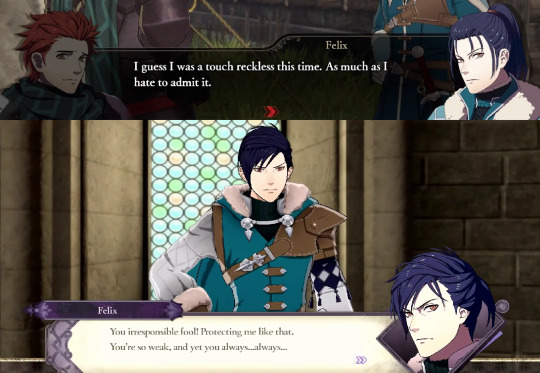
Rodrigue: Remember when I told you about the time I acted foolishly and got myself into trouble? Lambert broke through enemy lines and told me, "Don't waste your life." Although he was covered in wounds, so it wasn't very persuasive, was it?
Dimitri: Haha, indeed. You two were truly good friends. I'm so envious of my father.
Rodrigue: Haha, saying that would only make my son jealous. He'd ask, "What am I to you?"
As a descendant of the hero Fraldarius, Felix was expected to have the same kind of bond with Dimitri that Kyphon had with Loog and Rodrigue had with Lambert. But I never got the impression that he did. In Hopes, he inherits his father's title and position as the king's right-hand, similar to his solo ending in Houses.
His duty was to act as the Shield of Faerghus, and that involved protecting Dimitri, primarily from his own suicidal recklessness. That was a role he played in Houses as well, but he was mainly protecting Sylvain from himself instead of Dimitri. That's not to say that Felix did not care for Dimitri's safety in Houses. He just delegated those duties to Byleth, like when he asked her to "cage the boar".
Sylvain: Be careful, will you? …Jeez, you've even got bruises on your neck. If something were to happen to you, we don't know what will become of Faerghus, do we?
Felix: I won't say it'll go smoothly without me, but I always assume I might die on the battlefield.
Sylvain: Seriously, Felix… if you were to disappear now, what would happen to Faerghus and His Majesty?
It did not seem like being the Shield of Faerghus gave Felix a true sense of purpose or a reason to live. Sylvain's appeals for him to survive because Faerghus and Dimitri needed him did not seem to be very effective. In Hopes, he was pretty nonchalant about dying on the battlefield, causing Sylvain to scold him for being reckless. It was the exact opposite of their Houses Supports.
Sylvain: You and me, we'll support His Majesty and Faerghus, by complementing each other's weaknesses.
Felix: …Yeah. Um… in the future too, I'll count on you. I hate to admit it, but I probably need you. Maybe. Besides… without you, everyone else would be insufferably gloomy.
Sylvain: I get it. You don't have to say it. I'll always be with you, no matter what.
In Hopes, Felix was there to help Dimitri get back on his feet, both literally and figuratively. But Sylvain was the only one he could ever lean on. Felix was raised to believe it was his duty to be a literal human shield. And that's why it meant so much to him that Sylvain would always protect him.
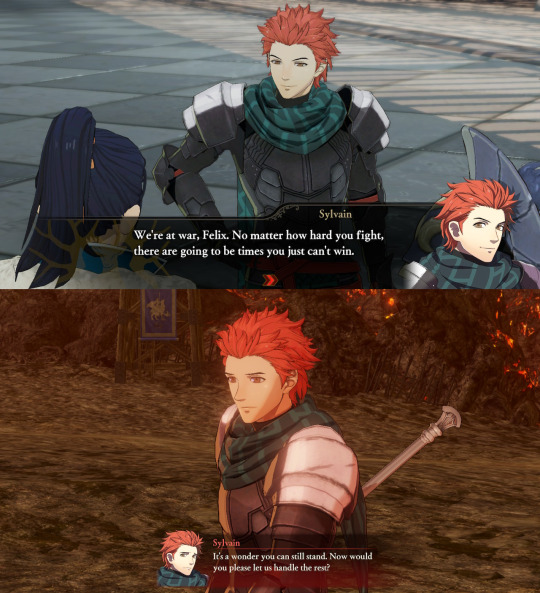
Shez: Well, you know, Sylvain, who always fights with you, ends up being swarmed by enemies...
Felix: …That's because every time, he boasts about taking charge with nonsense like "Leave it to me." Well, I believe he'd manage to get through any predicament, no matter how dire.
There was a change in Felix's C-Support with Shez. The localization stated that Felix would always get surrounded by enemies when fighting with Sylvain. But in the Japanese, it was the opposite.
Matthias: Rodrigue, fall back with the duke. The escape route is secured… Leave it to me.
Rodrigue: Matthias… What a fool. Make sure you come back alive. You must!
Matthias: It's been a while since I've fought to protect a friend's back. My blood is boiling with youthful fervor!
Claude: Risking your life to let allies escape, huh? That's the knightly spirit of Faerghus we admire.
When Matthias died in GW, he said he would be waiting for Rodrigue and Lambert on the other side. It's extremely similar to what Sylvain says when he dies in CF. And there were many parallels between Sylvain and his father in Hopes.
Felix: I can still stand… I can still wield my sword. I can still fight…!
Tch… With injuries like these, I won't withdraw…!
Sylvain: Felix! Stand down! Aww, look at you all beaten up… Leave this to us and fall back, okay?
Felix: Ugh… You better come back. If you're planning to die, I won't forgive you, Sylvain!
When Dedue is low on health during the SB battle at Ailell, Dimitri begs him to fall back because he cannot afford to lose him. But when Felix is low on health and can no longer stand, Sylvain is the one who comes to his aid. Rodrigue made it clear that he expected his son to fight to the death. But because of Sylvain he retreats. His future with Sylvain was the reason he chose to keep on living.
Sylvain: Ah… Felix. I'm glad you're safe.
Felix: You, always trying to protect me... Don't be reckless. Even though you're weak, you always, always...!
Sylvain: It's fine as long as you're safe. As long as you're alive, I…
Felix: You idiot! Don't joke like that. If you ever dare to die, I won't forgive you…!
It's more obvious in Japanese, but what Felix said to Sylvain at the Valley of Torment was almost the exact same as their A+ Support. Sylvain probably knew he was going to die, just like Matthias did in GW. He was fighting to the death as he avenged Ingrid. Even though he wanted to die together with him, if it came down to it, Sylvain was always content to sacrifice his life to let Felix live. He died as a true knight so that Felix wouldn't have to. Felix had the type of bond with Sylvain that he was supposed to have with Dimitri.
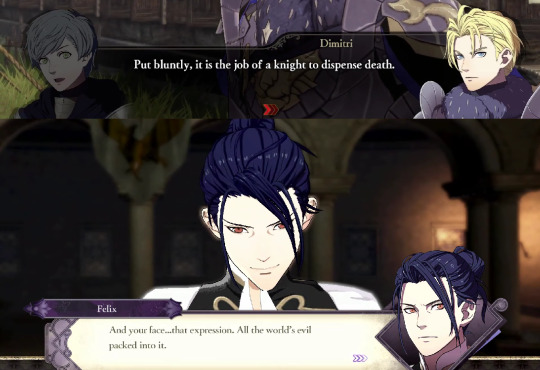
Felix: …Well, I was prepared for it to come to this. With Father… and also with that boar, we'll eventually have to part ways.
Felix did not want to become a knight for many reasons. In Japanese, he used the phrase "袂を分かつ" (tasuki wo wakatsu). It literally means "to separate the sleeves" and is often used metaphorically. The imagery evokes the idea of two individuals going their separate ways, often signifying a farewell or divergence of paths. That is his entire motivation if he joins CF.
Felix: For the past five years, I've been fighting under the emperor. …I've slain quite a number of enemies. Now, I must look just like that boar from back then. …It's the face of a cruel beast that revels in blood and violence.
But if he takes that path, he becomes the very boar he hated.
Felix: …He's dead. I heard he was beheaded… But… I didn't see his head. If, by some chance, he's leading that army…
Byleth: Are you truly ready to fight?
Felix: …Don't underestimate me. Even if it's him, I'm prepared to kill.
In VW, Felix suspected that Dimitri was still alive all along. But he still chose to stay with the Alliance.
Felix: …I never truly understood his hatred and anguish towards the Empire. If it were me…could I have saved him? Could I have… stopped him?
Afterwards, he wondered if he could have saved him from dying like a wild boar. Even if he had stayed with the Kingdom, it wouldn't have made a difference. Only Byleth would have been able to stop him. Felix would have just died pointlessly at Gronder like everyone else. But there was no way for him to know that. In both routes, he suffers from regret and wishes he'd died alongside Dimitri. He is a lost soul, who lives only for the sword and fights with a will to die.
Felix & Sylvain (Non-AM)
After the war, minor skirmishes continued throughout various regions in Fódlan. Felix, upon learning that there were battles still to be fought, chose to forsake his noble status and make a living as a swordsman. Over a decade later, he took on the role of a mercenary, and his employer turned out to be Sylvain, who had inherited the title of Margrave Gautier. The two of them were overjoyed to reunite, but their diverging paths meant that their fates would never intertwine further. After finishing his work, Felix left Sylvain's territory, embarking on another journey as a wanderer. It was a few years later when Sylvain received a sword that was unmistakably Felix's.
While Felix can eventually give up the sword and find some peace if he has a female partner, his paired ending with Sylvain is the single most tragic ending in the game. Despite having a chance reunion, Sylvain is unable to save him. While the reason for this is never stated, the Japanese ending offers a clue.
The phrase used in the Japanese ending is "道を違えた" (michi o tagaeta). It translates to "took the wrong path" or "strayed from the path." It implies making a mistake or deviating from the correct course of action, moral path, or intended direction. It emphasizes the idea of going astray or making an error in judgment.
Sylvain's arc was about realizing that his Crest did not decide his fate, he did. After Felix left him, he probably settled down with a random noblewoman, had children, and it was simply too late for him to start a new life with Felix. Because Felix went astray and chose an immoral path, it caused Sylvain to make a big mistake. Felix follows in Glenn's footsteps and dies alone, full of pain and regret. And I can't imagine that Sylvain's fate was any better when Felix's sword arrived on his doorstep. They can only be together in AM and their non-AM ending strongly emphasizes how that was the intended path for them.
Felix: Why did they die while I lived? …Even now, there's not a day I don't question. But I'm not as soft as you. I'll take my regrets to the grave. There are more important things to me now.
The localization did a faithful job with the Dimitri/Felix A-Support. It's just that, in Japanese, there was a line about how Felix would take any regrets to his grave. It was very similar to his A-Support with Rodrigue in Hopes. In AM, Rodrigue dies, and Felix never got to apologize for punching him. He even left a note in the confession box about that. But in Hopes, he could get closure with his father.
Felix and Dimitri's relationship was FAR from healthy. It probably would be much better for both of them to sever their rotten relationship once and for all and walk separate paths in life. And their A-Support was written with the idea that, if this was the final time Felix spoke to Dimitri one-on-one, that would be okay. He said what he needed to say and wouldn't have any regrets. Dimitri could sense his underlying compassion and was content to leave it at that.

Flayn: But isn't there a future beyond that where Felix can avoid taking lives?
Felix: …It's fine to dream of such a future, but I don't belong there. After all, I've been swinging a sword ever since I was born. ...Swordsmen are troublesome creatures. Fighting for peace, yet losing our purpose when peace finally arrives.
Flayn: …Haha, if that's the case, you need not worry. […] If you felt like you lost your purpose in life, surely you would find a new purpose. It's not like you to fear loss.
Felix: …...… You really are something, aren't you? Huh… I've never even thought about it. Maybe there is such a way of living after all. ...I'm starting to get interested. Perhaps swinging a sword for the future you dream of wouldn't be such a bad idea.
One way Felix resembled his father was that he couldn't live without a great purpose in life, and if he lost that purpose, he'd need something to fill the void. He needed a future to look forward to during peacetime. He was intrigued by the idea that one day he could chop wood, fruits, and vegetables instead of people.
Felix: A millennial festival? Talking about festivities at a time like this, you're as carefree as ever, huh…
Sylvain: No, no. While it's a celebration, it's also a political gathering where rulers from various countries gather. It wouldn't hurt to think about the future, right? You can't stay uninvolved either.
Felix: Well, that may be true. For now, focus on the battle at hand, Sylvain. If you die here, there won't be any millennial festival or anything.
Sylvain: Oops, a valid point! Well then, for now, I'll quietly prepare for the deployment.
Felix: Do that. Don't neglect your preparations and end up losing your life in some trivial place.
He wielded a sword because he was afraid of loss. Getting stronger would not fulfill him the same way a relationship could. His non-AM endings really emphasize the fact that the sword was just filling the void of a partner.
Felix: I find it easier to wield a sword than to hold a woman's hand.
But personally, I think he was the only gay character in 3H (well, other than perhaps his father). He got along well with women, but I was struck by how unromantic his paired endings with them were. He is the only man to propose to Byleth at the training grounds instead of the Goddess Tower. He spends a lot of time apart from her in their paired ending and is happiest exchanging swords instead of words when they actually do see each other. It felt more like he was replacing the loss of his brother through her than really being in love.
In his ending with Flayn, he continues to wield a sword as Dimitri's right-hand and only gives it up in favor of a quiet life on his estate when Dimitri dies. When he marries Mercedes, Bernadetta, or Dorothea, he becomes the king's right-hand and travels across Fódlan with Dimitri. He spends a lot of time away from Bernie. Dorothea has to accompany him on the battlefield to get quality time.
His ending with Leonie is not romantic and they just become drinking buddies. In his ending with Ingrid, he gives up the sword when he's injured and does not regret it. The only two female paired endings that don't mention warfare, swords, or knighthood are Annette and Lysithea. But it felt like he fell in love with singing, not Annette. And with Lysithea, she dies young and leaves behind her cake recipe.
Felix: You're not cut out to be a knight. How about you start seriously looking for a marriage partner?
Ingrid: …What's that supposed to mean?
Felix: Just as I said.
Ingrid: I understand that you dislike things like chivalry and knightly pride. Just because of that, you keep running away from your duty as the heir of the house… You have no right to speak so high and mighty.
In Japanese Felix did tell Ingrid to go find a husband, but he used the word "結婚相手" (kekkon aite) instead of "夫" (otto) which means husband. "Kekkon aite" refers to someone whom you are seriously considering as a potential marriage partner but may not be formally engaged to or married yet. He wasn't telling her to go find the next man to offer a huge dowry and immediately get engaged.
He was saying that she would be better off dating, finding a serious partner that she loves, and eventually getting married. He did not say this in a disparaging way. He didn't want her to end up like Glenn nor did he want her to blindly follow the orders of a king who he considered bloodthirsty. He genuinely thought that being a wife would be a safer and more fulfilling lifestyle than being a knight.
Dimitri & Felix
Dimitri formally succeeded to the throne of the Holy Kingdom of Faerghus after his coronation, dedicating his lifetime to the governance and reform of Fódlan. Behind many of his achievements stood Felix, the Duke of Fraldarius, who sometimes acted as the king's right-hand man and at other times served as his advisor. Bound by a lifelong steadfast friendship, it is said that Felix mourned more intensely at Dimitri's passing than even the queen herself. The tale of their lives, akin to the legendary Lion King Loog and his sworn friend Kyphon, will be passed down through the ages as one of the stories that adorn the history of Fódlan.
In any case, Felix was projecting his own feelings onto Ingrid. If you pair her with Dimitri, it says she supported him as a wife and queen, but still insisted on fighting on the front lines in battle like a knight. If you pair Felix with Dimitri, it says he mourned the king's death more than the queen. Ya know, the wife. Chivalry promotes homoromantic social bonding among men.
Rodrigue had a wife and kids, but he devoted his life to a married (presumably heterosexual) man. He used his position as "sworn friend" of the king to fill the void of an actual gay relationship. He lost his reason for living when Lambert died. In this ending, Felix ends up following in his father's footsteps. I don't think that's a satisfying ending for him.
Dimitri/Felix: "彼らは生涯固い友情で結ばれ" means "They were bound by a lifelong strong friendship." This phrase emphasizes the steadfast and enduring nature of their friendship. The word "固い" means "firm" or "strong," implying a friendship that is resilient and unwavering.
Sylvain/Felix: "生涯無二の友であり続けた" means "They remained lifelong inseparable friends." This phrase emphasizes the unique and unparalleled nature of their friendship. The term "無二" means "unparalleled" or "incomparable," suggesting that their bond was extraordinary and unmatched.
I would also like to compare the descriptions of friendship in the Dimitri/Felix ending to the Sylvain/Felix ending. Both phrases convey a deep sense of friendship, but they emphasize slightly different aspects. Dimitri/Felix emphasizes the enduring strength and solidity of their bond. In terms of depth, Sylvain/Felix carries a stronger sense of exclusivity and uniqueness in their friendship.
The term "無二" was also used in Ingrid's AM paired endings with Ashe and Dedue. Her arc was about belonging to herself, not a man. She wanted to go down in history as a knight, not as a wife. For that reason, her paired endings with Ashe and Dedue in AM don't specify her marital status. But the writers still wanted to suggest that she and her male partner were possibly lovers. So "無二" was chosen to emphasize their inseparable bond.
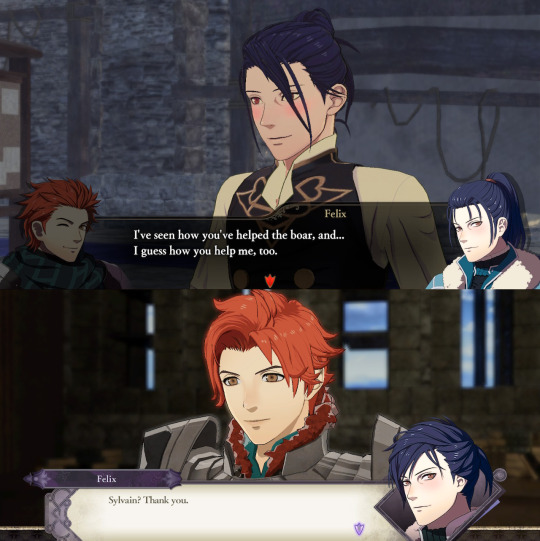
Felix & Sylvain (AM)
Felix, who succeeded his deceased father Rodrigue as Duke Fraldarius, and Sylvain, who inherited the title of Margrave Gautier after his father's passing, both devoted their efforts to the restoration and prosperity of the Kingdom. Even amidst their busy days, their friendship never wavered. Felix would occasionally show up at the Gautier family's residence and insult Sylvain, and Sylvain, in turn, would visit the Fraldarius house frequently, solely to tease Felix. Throughout their lives, they remained inseparable friends, and there is even an anecdote that they coincidentally passed away on the same day.
In this ending, both men inherit their fathers' titles, but neither of them is forced to fulfill their unwanted patriarchal duty. Their bond is characterized by mutual devotion, not chivalry or bloodline. Their relationship effectively goes back to how it was when they were kids. Sylvain is free to go where he wants and spends his life with someone he loves, not just someone he can have Crest babies with. While he becomes a famous cheater in his solo ending, and a renowned lord in his others, here historians remember him most for his closeness with Felix.
Like Rodrigue, Felix wished to live and die alongside another man. When paired with most of his wives, he becomes the king's right-hand, a role that would require him to wield a sword and travel. But not in this ending. He stays in Fraldarius territory so he can be available for frequent surprise visits. Sylvain was his true purpose in life, and neither can live without the other. And to me, that is the ideal ending to both of their character arcs. The Shield of Faerghus died like a true knight. "The Shield's Successor" died like a true wife.
#fire emblem#fire emblem three houses#fe3h#sylvain jose gautier#felix hugo fraldarius#sylvix#fe3h meta#this is my otp from 3h#this meta is a doozy and looong#sorry i just had a lot of thoughts about them#and i really wanted to delve into their psychology#because they are such fascinating characters
148 notes
·
View notes
Text
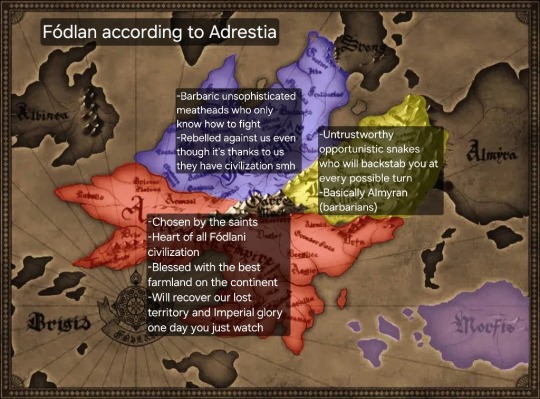
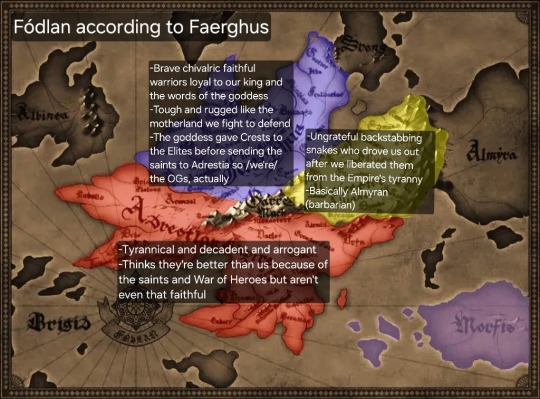

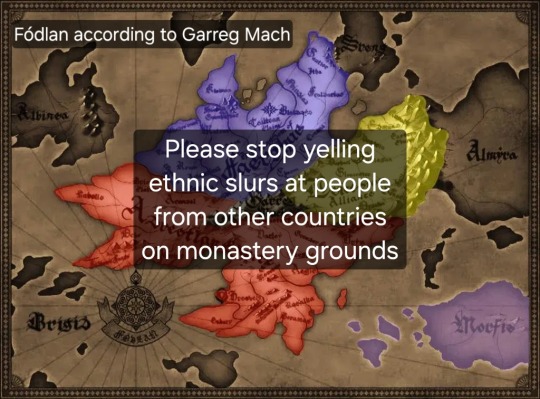
3H intra-Fódlani relations if they were realistic.jpg
After reading this I grew even more convinced that Officer's Academy would just be a free for all PVP zone between different nationalities lmao
Like come on, you take a bunch of teenagers~young adults from three countries that share land borders, group them by nationality, then have a big important annual event that commemorates a historical battle between the nations. I know they're coming up with new insults every week like graduating depends on it.
90 notes
·
View notes
Text
Kemetic Influences on Fire Emblem Three Houses (Part 1)
I know I have made a more unstructured post regarding this before; however, I am certain in my assessments that the influence of Ancient Egyptian mythology had on 3H is vast and more varied then I, personally, have seen people discuss. Yes, we know of the etymology behind Sothis and Seiros' names, but I believe these connections go much deeper than the surface level.
This will be structured with me discussing what I am most sure in to what is more interpolation on my part. This part about Sothis is so long that it needs to be it's own post entirely.
Sothis is based on Hellenistic/Roman period worship of Lady Isis
As we know, Sothis' name can be traced to one of the names of Sirius, specifically the Hellenized name of Sopdet the goddess of said star. However, this is surface level. Sopdet was often syncretized with Isis during the Hellenistic period and in Lady Isis, I believe, there are more clear allusions to Sothis and how she acts as a deity within 3H's world.
Lady Isis is an Egyptian deity who was worshiped across the Mediterranean during the Hellenistic and Roman period. Sothis in her mythology, actions, and how she is depicted in-game shares remarkable similarities to Isis. The images and sources I will be using as a reference come from Dr. Andrew M. Henry's (ReligionForBreakfast) video on the topic and FEDatamine for everything regarding 3H.
Sothis and Isis are both "great mother" deities who act as supreme goddesses to their followers.
Even before coming to supreme status in the Mediterranean, Isis was an incredibly important goddess within Egypt. She was the bringer of magic, a guardian of women, a compassionate goddess who wished to relieve all human suffering, and much much more. All of these traits are extremely close if not direct parallels to Sothis.
We know that magic within Fodlan is directly connected to Sothis through the visual of all the magic circles (save for Agarthan dark magic) and it can be postulated that, like Isis, Sothis magic was beyond the capabilities of other humans or other deities.
Faith magic in particular is directly correlated with the ability to heal and protect, which is one of the main domains of Lady Isis in antiquity and modern day. She was the healer of the sick and injured, so much so that she often traveled in human form so that she could aid those who called out to her. I don't believe it is a coincidence that healing magic was reskinned as faith in this game given that context.
And the connections continue beyond that. Consider this text from a temple to Isis in Cyrene:

During the Hellenistic period, Isis' power and prominence grew to wear she became a supreme goddess within these polytheistic societies. She was believed to be the ruler of time and fate itself, and, as stated here, one of the creators of the cosmos who first set time to course. She was often depicted holding a steering rudder or with the planet beneath her very feet as the goddess through which all fate flows.
Next, take this quote from Lucius Apuleius: The Golden Ass a text from a satirist, but nonetheless believed to hold elements of truth to Isis' worship during the Roman period.
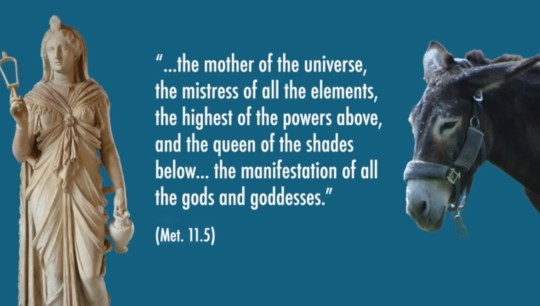
Once again, we see the language that would describe a supreme, cosmic deity. Compare to similar wording in The Book of Seiros Part 1:
"The goddess is all things. She is heaven above and the land below.
She is eternity incarnate. She is the present, the past, and the future.
Her eyes see all. Her ears hear all. Her hands receive all."
Due to this language, it is believed by some religious scholars, and presented within the video, that within the mysteries of Isis there was an element of henotheism at play. A philosophy within religious practices where one god is worshiped a supreme deity whilst not denying the existence of other gods, and such a system of worship is what I believe to be happening within Fodlan's religious context. Other gods are known to exist, they are spoken of in the Book of Seiros; however, Sothis is supreme goddess of Fodlan.
Now, I ask, what is Sothis' primary characteristics within the Church of Seiros and as depicted in game?
She is the supreme Goddess of Fodlan, who's depicted with having control over time and fate itself (literally divine pulse), spoken of as a savior not only in the past but also through the actions of her vessel Byleth, who created all life (or at least the Nabateans) as "The Beginning", and the arbiter of souls as an explicitly afterlife related deity.
All of these traits are direct parallels to Lady Isis, and I am not even finished listing all the similarities.
First take this quote from The Book of Seiros Part 2:
"In the beginning, amid the great cloudless ocean, Fódlan came to be. At the end of a long journey, the goddess glimpsed that land and there alighted. Upon that sacred ground, she breathed life into the world and created all of the creatures upon it.
By the goddess's hand, plants took root, birds took to the sky,
and animals roamed the land. Last of all, she created humanity."
Within multiple Egyptian creation myths one of the prevalent and constant features is the primordial ocean of Nun. It was place of nothingness and chaos all at once, a "cloudless ocean" if you will. And from that ocean came the first land, the benben, and from there any number of gods created all life. This includes Isis, who within the inscriptions at Philae, is described to have created all life and the cosmos itself (Žabkar 1988, pp. 134.):
"Indeed, she is the Lady of Heaven, Earth, and the Nether World, having brought them into existence through what her heart conceived and her hands created..."
Both of them are related to the afterlife and are explicitly called out as deities of fate. Once again from the story of Apuleius:
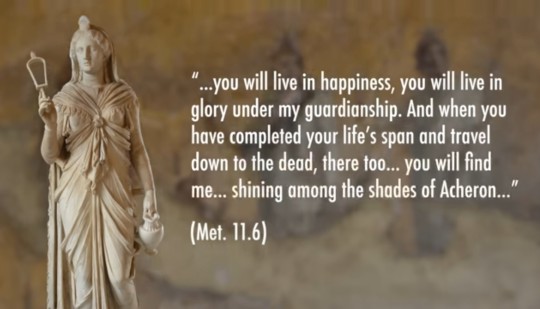
Lady Isis' connection to the afterlife as she who guides the soul to it's fate goes back even further in Egyptian texts and she has been a funerary deity all the way back in Old Kingdom Pyramid Texts. Take that in context with Rhea's line of Sothis being the "arbiter of souls" and much of her cosmology in-universe revolving around the afterlife you have another link between them.
Isis was said to be able to prolong a person's life if they were to follow her mysteries as she knew the lifespan of all people and could manipulate it with her magics. She also typically interacted with her followers via dreams. This is something Sothis is shown to do constantly with her appearing in Byleth's near death moments, within their dreams (at the beginning of the game and later during her speech regarding Fodlan's plight. And can I say, Sothis being aware of the blood being split and awakening Byleth to explicitly put it to an end is a very much like a savior goddess). Then, in Rhea's backstory, she said that she heard Sothis' voice within the Holy Tomb (or within Enbarr) and that is what lead her to take up the name of Seiros and begin to fight against Nemesis.
Sothis inspiring the creation of the Adrestian Empire through Seiros, and Byleth's place to chose the fate of Fodlan, directly correlates to Lady Isis' role as a goddess of kingship. Her protection was explicitly called upon both during the defense of Egypt and during campaigns of military conquest, and that she alone was comparable of armies of soldiers.
Isis and Sothis both are also transparently related to nature. They are callers of the rains (cited in the Philae Hymns for elsewhere and in-game for Sothis) and related to bounties of the harvest. In this way, Sothis may also cross into the sphere of Osiris who was more explicitly a fertility god and the ruler of the dead/judge of souls.
An interesting similarity can be called to the myth of Osiris' death and dismemberment at the betrayal of his brother Set, Isis' incomplete resurrection of her husband, and Horus' becoming king of Egypt after contending with his uncle where he avenged his father; with how Sothis herself was killed and dismembered for her power, then Seiros' creation of Adrestia (where he also chose the first king) to avenge her mother, and her inability to resurrect her due to Sothis' body being scattered and incomplete (at least, until her ib/Creststone was placed within the intact khet of Byleth). But that is an aside for now.
I want to finish this off with a look of the physical similarities between depictions of Isis and Sothis. Once again from Apuleius:
"Firstly her long thick hair in tapering ringlets was loosely spread over her divine neck and shoulders, and her head was crowned with a complex garland of interwoven flowers of every kind. At the centre, over her brow, a flat disc like a mirror or rather a moon-symbol shone with brilliant light.
Coiled vipers reared from the right and left of her coronet which was bristling with erect ears of corn. Her multi-coloured robe was of finest linen, gleaming here pure white, here a saffron yellow, there flaming rose-red, with a woven border flowing with flowers and fruit, and what dazzled me most of all was her jet-black cloak with its full sheen, wrapped gleaming about her, slung from the left shoulder, knotted at the breast, and sweeping over her right hip.
It hung in sweetly undulating complex folds down to a tasselled fringe, and along its borders and over its surface fell a scatter of glittering stars, round a full moon at the centre breathing fiery rays. And she bore a host of emblems."
To me, there are some similarities between this and the depiction of Sothis plus how Rhea dressed and Byleth's Immaculate One outfit. The floral motifs of lotus flowers, the crisp white of Sothis' mural appearance and those of Rhea and Byleth, the crowns of flowers and star motfis, the way Isis bears many emblems around her, much of it bears some similarities to Sothis.
But this is not the only depiction of Isis, let me show you some visual representations.
Let us compare this mural of Sothis to some depictions of Isis:

Here are two of Isis from Pompeii with one being a mural and another a famous reconstruction of a statue:


Again, while not 1:1 there are some visual similarities in design. The white linen of her dress and the cut of it are fair similar, as are the wings that are associated with nearly every depiction of Isis. To show and example from Egypt:

The fact that Sothis is shown with feathered wings in particular feels important given her other similarities with Lady Isis. Plus the throne hieroglyph that represents Isis and often often seen above her head looks exactly like the throne of Sothis as seen in the Holy Tomb. Lady Isis is also known as the "Lady of the Throne" just like how Sothis is called the "Girl on the Throne."
The amount of connections between them does not feel like coincidence to me. If you want to take the Romance into account as well, both Sothis and Isis are associated with floods in that case, especially with floods that are said to be caused by their sorrow. Sothis is a savoir deity who protected and saved from Fodlan from the destruction of the Agarthans; she is said to have caused a flood in the one, possible, Agarthan account we have.
Her name is Sothis, transcribed from Sopdet, lady of the blue star, who was syncretized with Isis who also became manifest within Sirius. I think I will make one more note: the Rite of the Goddess' Rebirth is transparently related to Wep Ronpet, the cosmological new year in Kemetic religious practice.
Both take palace in late July (or into early August for some dates of Wep Ronpet), both are related to the rising of a particular star (the Blue Sea Star is based on Sirius, this fact), both are related to the rebirth of the world and the gods, and both are a day of celebration with family and friends.
As one final aside: in Kemetic practice, worship of the gods has always been an intimate and close affair, both in antiquity and in modern practice. Gods are active and immediate presences within the world, and they are presently felt within physical parts of the world. Ra, Aten, and other solar deities are all the sun, Nut the sky, Shu the air and wind. Various "truths" about natural phenomenon could all be true at once and created a multi-facted view of existence. So Sothis having the Blue Sea Star as her "home" are acting as her spiritual double entirely makes sense within this framework.
Sothis' laws are also fairly similar to the Laws and philosophical underpinnings of Ma'at; however, delving into that is outside the scope of this post. So I will need to leave things off here.
#fe3h#fire emblem three houses#fire emblem#sothis fire emblem#fe3h meta#stars rambles#i'm sorry if this feel unorganized i've been trying to synthesize my thoughts for days#sothis having all these allusions to lady isis has been very obvious to me for years#so i'm happy to have post laying it all out#and obviously this isn't the only influence#but one that i feel doesn't get talked about enough#and it's important to me#so with that#dua lady isis
27 notes
·
View notes
Text
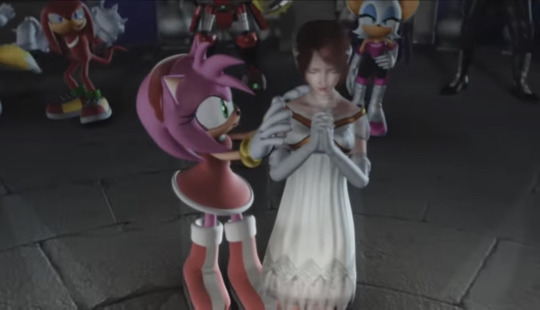
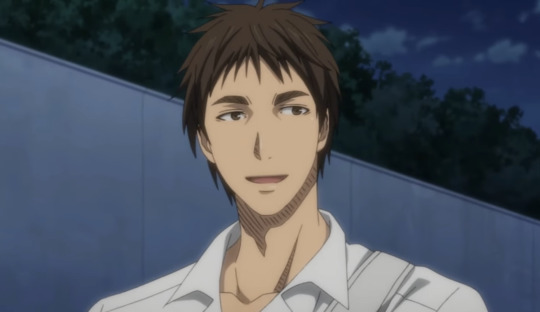

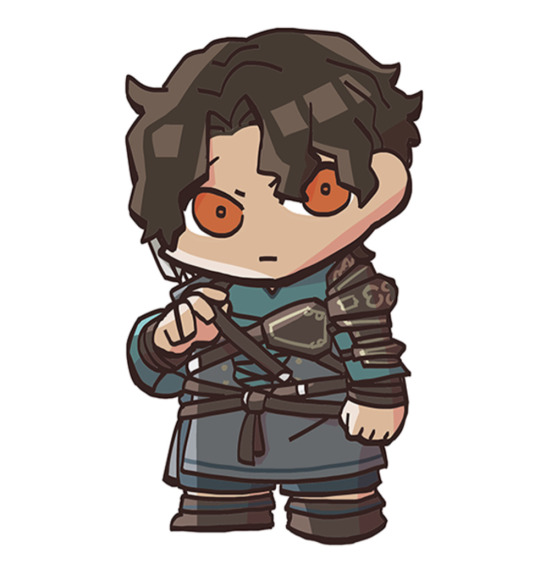


Hating on them is an instant red flag for me because there is never any good criticism that comes out of them.
#rubi’s post#sonic the hedgehog#kuroko no basket#kuroko's basketball#fire emblem three houses#my adventures with superman#superman#amy rose#princess elise#kiyoshi teppei#leonie pinelli#cyril#rhea#lois lane#meta#opinions
65 notes
·
View notes
Text
Here, have some semi-disorganized thoughts, because the more I think about what’s implied about Lambert and Patricia’s relationship, the more I find myself side-eyeing… Lambert, actually.
(And to be clear, I consider Cindered Shadows and the information that arises from it questionably canon at best, but when it dovetails with what we already know from base 3H, it makes sense to include it. And when you’re talking about Patricia and Lambert’s relationship, you can’t really avoid Cindered Shadows, so here goes.)
First of all, as a disclaimer: I do believe that Lambert was genuinely infatuated with Patricia/Anselma. I’m not denying him that. It’s just… everything that comes after it that feels questionable. Because that doesn’t feel like why he married her, based on what comes next?
[That said, maybe don’t read if you have a particularly rosy view of Lambert. I don’t characterize him as a monster, not by any stretch, but like I said, I side-eye him hard.]
So you’ve got this banished former Imperial consort living in Kingdom territory. And she’s a woman of high rank (at least formerly, but her being the mother of one of the Emperor’s children is still going to be true, regardless of whether or not she is still regarded as one of his consorts), and upper-class Fódlan society as a whole is extremely heteronormative with all of the subordination of women that implies. So on the one hand: she needs to be kept according to her station, and that involves having her married so she can reside over a noble household once again, but the only man of high enough standing to marry her, a former consort of the Adrestian Emperor… is the widowed king. And on the other hand: she can’t be allowed to potentially run amok causing political strife in the Kingdom by trying to regain her old position (we don’t know precisely why Anselma was dismissed and exiled, but based on what we’ve seen of the Imperial nobility, it’s not unreasonable for Lambert and the Kingdom nobility to assume that she would be putting a lot of time and energy into trying to regain her former position, and it’s equally reasonable to assume that they’d want to stop her from doing that in Kingdom territory, since it could cause strife between the Kingdom and the Empire that they absolutely do not need), and the best way to keep her from doing that is to tie her down to a husband who can Control Her, but again, the only man of high enough standing to marry her, a former consort of the Adrestian Emperor… is the widowed king.
This does not feel like a spur-of-the-moment love match. It feels more like Patricia is equal parts charity case and quasi-political prisoner in Fhirdiad, with all of it smoothed over by having her marry Lambert, so that they can both avoid drawing ire from Imperial factions who wouldn’t want them sheltering Anselma in the Kingdom in a position of such high honor as being a part of the royal court (likely a large part of why she changed her name to Patricia in the first place, or perhaps why the decision was made for her that she’d be changing her name), and so they can avoid drawing the ire of Emperor Ionius, who by all accounts loved and favored her, by shutting her up in genteel imprisonment. Give it all a gloss of ‘new queen consort’ to appease the emperor, and give it a gloss of ‘her ties to her homeland have been heavily severed with this new marriage, to the extent that she’s even been stripped of her old name’ to appease those in the Empire who don’t want to see her come back. Patricia’s primary consolation is that her new husband is genuinely infatuated with her, and thus is likely to treat her well.
At least, that must be how it seems to her at first.
And I say all of this because some stuff that we learn about Lambert and Patricia’s marriage just does not make sense if you assume that this was a spur-of-the-moment love match?
First of all, Dimitri says outright in his and Hapi’s B support that “for all intents and purposes, [his] stepmother was completely cut off from the outside world. Suffice it to say few knew that [his] father had taken a second wife.” So first off… that doesn’t sound right for a normal marriage. At all. Even Dimitri acknowledges that the union between his father and stepmother caused a great deal of speculation; even Dimitri, who has a history of white-washing his past to make it all seem a lot rosier than it actually was, grasps that there was something not quite normal about this marriage. You would expect a queen to be engaged in charitable works across the Kingdom, you would expect her to leave Fhirdiad on pleasure trips, either with her husband or alone, but instead, it seems as though her movements were heavily curtailed.
Second, Dimitri states in his and Hapi’s A support that “although she was the queen consort, in truth, [his] father and stepmother were not even allowed the dignity of being alone,” further asserting that Cornelia constantly inserted herself between them. So you’re telling me that Lambert is so ineffectual that he can’t even ask, or use his authority as king to order, that Cornelia leave the room so he can be alone with his own wife? That doesn’t sound right for a man assertive enough to plan sweeping political reforms against the protests of a wide swath of his own nobility. What sounds a bit more like right is that Lambert doesn’t particularly care if he and Patricia are left alone together, and what suggests about the nature of their marriage is that Lambert is perhaps less her husband than he is her quasi-jailor.
Third, Dimitri will eventually admit that Patricia was fairly cold towards him. He states in his B support with Hapi that it was his stepmother who raised him, and Hapi notes that he shares many of her mannerisms. While it’s not fair of Patricia to be cold towards Dimitri, regardless of what the true nature of her relationship with Lambert may or may not be, if her marriage with Lambert was equal parts charity case and genteel imprisonment with a ‘queen consort’ coat of paint slapped on over it, I think it might explain her coldness. Patricia’s feelings towards both Lambert and Ionius are up in the air, but without a doubt, she loved Edelgard, her child. But not only has she been separated from her daughter for good and trapped in a gilded cage called “marriage” clear on the other side of the continent from her, she’s now had her quasi-jailor’s kid foisted upon her to raise, as well. Like I said, it wouldn’t be fair for Patricia to let her resentment regarding her position spill over onto Dimitri, but it’s still a pretty human reaction, and if things are as I think they are, then it unfortunately makes perfect sense that she has little to no interest in being a warm stepmother to Lambert’s son.
That brings us on to Edelgard’s time in Fhirdiad. We know that Lord Arundel, Patricia’s brother, abducted Edelgard and brought her to Fhirdiad during the Insurrection of the Seven, though the reasons for his abduction of his niece are murkier. Dimitri frames it in the Childhood Memories scene in ‘The Cause of Sorrow’ as Edelgard and her uncle being in exile together, and goes so far in his A support with Hapi as to state that Lord Arundel had sought asylum in the Kingdom. Edelgard herself frames it as an abduction, something that was done to her without her consent, let alone her father, the emperor’s, and again, though her uncle’s reasons for doing so are murky, I am inclined to think that Edelgard is in a better position than Dimitri to know if it was an abduction or not, so I am characterizing this as an abduction as well. Even if Lord Arundel was seeking asylum with his niece in tow, he did still kidnap her to do it, and we don’t know his exact reasons. They could be altruistic—Arundel trying to save Edelgard from being experimented on like her brothers and sisters—or he could have done it to seize an advantage over Ionius, as Edelgard was one of only a small handful of his children to have a Crest. We just don’t know.
We know from the Childhood Memories scene in ‘The Cause of Sorrow’, from Dimitri’s own lips, that he and his father visited Lord Arundel and Edelgard when they were living in Fhirdiad. But we know that Patricia didn’t find out that her brother and niece had been in Fhirdiad until after they were both long gone.
What?
Dimitri and Hapi’s A support frames Patricia’s predictably furious reaction as being all Cornelia’s fault. That Cornelia had planted the idea in her head that Lambert had deliberately withheld this knowledge from her, and that in reality, Lambert had been just as in the dark about Arundel and Edelgard’s true identities as Dimitri was. But I don’t buy that? Dimitri states that Arundel was seeking asylum in the Kingdom, and in order to be assured asylum, he would have needed to explain who he and Edelgard were, and spin some story to make this look less like an abduction. Edelgard is stated to strongly resemble her mother, as well; surely Lambert would have noticed.
And even if you believe that Arundel could have lied about who he and Edelgard were and gotten away with it, there’s still the fact that Dimitri found out that Edelgard was A) the girl he had known in Fhirdiad years ago, and B) his step-sister, before he entered the Academy, which would indicate that Lambert had known about it at the time. Again, Lambert is painted as being a very politically savvy man. At no point is he painted as being a dunce. So Lambert absolutely did know who they were, and he absolutely did conceal that information from Patricia. No tricks by Cornelia required! Likely all she had to do was voice aloud the thoughts already fulminating in Patricia’s own mind.
Dimitri dismisses the idea that he did this on purpose on the grounds that he can’t think of what his father would have had to gain from purposely concealing the knowledge from Patricia, but I can think of a few things. Dimitri doesn’t want to see it, because again, it contradicts the rosy picture he’s painted of his past.
The absolutely kindest explanation I can think of is that Lambert is perfectly aware that this is a political powder keg he has on his hands. Regardless of whatever story Arundel spins to him on why and Edelgard are in Fhirdiad, this is an abduction; it was done without the consent of Edelgard’s custodial parent, and thus he has a kidnapped Imperial princess in Fhirdiad. He has to be very careful about how he handles the situation—he could all too easily spark a diplomatic incident between the Kingdom and the Empire if he handles it wrong. It’s possible that he did not want to introduce Patricia to the powder keg out of the fear that she could be the spark that ignited it by understandably demanding that her daughter be given over into her custody.
But even this kindest explanation demonstrates that Lambert doesn’t consider Patricia an equal partner in their marriage. That’s probably not so unusual for noble marriages in Fódlan—again, upper-class Fódlan society is excruciatingly heteronormative, with all of the subordination of women that that implies—but he’s not even thinking about it in terms of introducing her into the situation to try and ferret out the truth of why Arundel and Edelgard are in Fhirdiad, not even thinking about the fact that Patricia’s brother and daughter might let something slip to her. Not only does he not consider her an equal partner, he doesn’t even consider her a useful tool.
And that’s the kindest explanation. Others include that he just straight-up never took her feelings into consideration, that he never stopped to consider her feelings on the matter for even a moment. Others include that he deliberately concealed it from her because he didn’t want Patricia to be reminded of her old life in the Empire, because he did not want her to reestablish her bonds with her old life. Whether it was because he didn’t want her causing political strife that could endanger the Kingdom, or because in his infatuation with her he simply didn’t want her to leave, that’s not clear. It could be some combination of the reasons I stated above. It could be something else altogether. It could be all of them at once, stitched together into some monstrous leviathan of the ways women are disregarded by their husbands in societies like these, and all of the suffering that derives from it.
This was the straw that broke the camel’s back. I used to think that Patricia had to be extraordinarily stupid to still trust Cornelia enough to go to her for help after she saw what she was doing to Hapi and was cognizant enough to be horrified by it, but nowadays, I think it’s more emblematic of how desperate she was. She wanted to be reunited with her daughter, and if she wanted that, if she wanted to be Anselma again, then Cornelia was the only person she could turn to for help. She had no support network in Faerghus. Equal parts charity case and political prisoner, she had none of the normal recourse against mistreatment. She couldn’t look to her husband for help. He had already demonstrated that he had no interest in reuniting them. Their marriage was a farce, after all.
And no matter where she lived, Anselma was never more than a pawn on somebody else's gameboard.
#Fire Emblem Three Houses#Fe16#Meta#Anselma von Arundel#Lambert Egitte Blaiddyd#hello to the absolute hellscape that is Fodlan#and the tragedies that can arise from not treating other people with care and respect
63 notes
·
View notes
Text
god maybe its already been pointed out but I LOVE the positioning of byleth in the ending murals/tapestries of the different routes

in crimson flower, there's no explicit byleth, but they're hinted at as the angel carrying the palm leaf (peace) and crowning edelgard with laurels (victory in battle). they are placed just as hubert, as edelgard's guiding hand and the one who will lead the world to glory
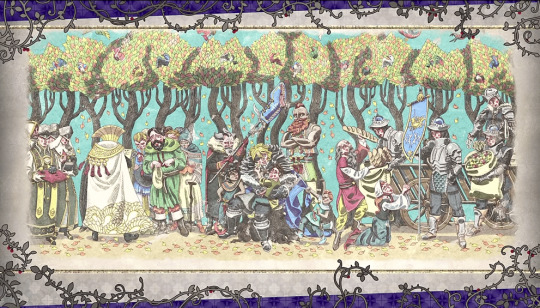
in azure moon, byleth is explicit — the archbishop, who takes gold from the church and puts it in the hands of the poor. the knights are pictured on the other side, literally giving bread to the hungry, while byleth listens to the gilded clergy with one ear and the poor and hungry with the other, balancing heaven and earth (side note, I love dimitri in this one . he's so tender and sweet with the kids)

in verdant wind, byleth is not there at all, even as claude rolls out the new constitution and welcomes new allies from foreign lands. this is so interesting to me given byleth's position in the verdant wind route — but then, any one of the figures could be byleth. is byleth the bearded ambassador in the purple cloak, opening the doors to the foreign king? are they one of the helmed knights, singing praises?
or is byleth, themself, the throne under that purple canopy that the new world bows before?
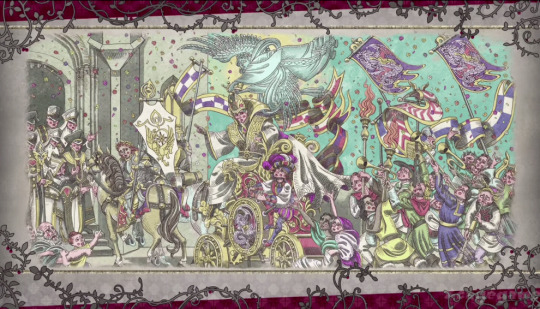
then, in silver snow, it is the most explicit. byleth is crowned by the blue sea star and wearing the robes of the enlightened one and a bishop's miter. people fall to their knees in adoration as they pass, no matter their race or creed. a knight in golden laurels (ferdinand?) precedes them in their victory parade, while behind them, the victorious Immaculate One adorns their banner.
byleth, here, is King and Goddess and Man and Divine, and im going to stop here before I devolve into catholic symbolism, but ALSO look at their hand raised in blessing JUST LIKE DEPICTIONS OF JESUS it could not be more clear where the inspo for the church of seiros came from
idk its mad cool and I am always yelling about it
#soren talks#fe3h#fire emblem three houses#meta talk#this game is so cool#im frothing at the mouth#byleth eisner
152 notes
·
View notes
Text
HEY LOOK IT'S DIMITRI'S EYEBALL ON A CAKE LET'S EAT IT
...and now that I have your attention, help me settle this once and for all!
What do you, viewers at home, believe lies underneath Dimitri's eyepatch during Part II of Three Houses?
#fire emblem three houses#dimitri alexandre blaiddyd#fe3h#fe3h meta#If you've read the 2020 NinDo interview you will recall that the eyepatch is little more than an aesthetic choice#Plus the artbook's comments also prove it#“IT SHOWS HIS SUFFERING” ok how did he injure it then “UHHHH”#So in this case#speculation doesn't interfere with canon#something fun for a change
28 notes
·
View notes
Text
I think a lot of what people miss about Rhea's character when trying to talk about how she handled 'literally everything' is what exactly Sothis' war with the Angarthans and later The Red Canyon meant, on a cultural scale.
Because the loss of the Nabateans is a genocide. She has not just lost siblings, nieces, nephews, teachers and family. She has lost her entire culture.
How many recipes have been lost, plant knowledge, rituals and oral stories. They must have had holidays, did they have another language? Dialects? Ways of life. She is one of the last remaining people who had any knowledge or understanding of their culture. Out of the other four, two have given up, the third, Seteth, wasn't there and might not have even been living there, and the fourth is Seteth's daughter who was with him.
Everything about Seiros from the moment her vengeance is over is now about the preservation of her culture and her family's memory. And every time Rhea expresses fear or rage, it is not solely for herself, but at things that get in the way of these two things.
Because the church is not entirely a church. It is a memorial to what happened.
When people revere things like crests and the goddess, they are honoring her people. The sacred weapons are the bones of her family, used to enforce the church, and therefore enforce the safety of their memory.
It's why a lot of Rhea's kindness VS her upholding a shitty system might not make a lot of sense at first. Why is someone who is actively sheltering the poor, personally picking out herbs that will ease her students suffering, and expresses such genuine desire to help, also allowing such systemic disparity?
Because she doesn't see the crest nobility system in terms of human politics. She sees it as the blood of her family and the magic of her people being upheld as something important; no individual has to die and be forgotten if their blood is treated as sacred.
Rhea genuinely loves the people around her and wants what's best for them.
Rhea will always put the preservation of her culture and her family above all else.
These two things can coexist.
(Admittedly, while I think her choosing to burn down the city in CF is in character with this context, I also fully believe they did that just to make killing her seem Totally Okay and that you were Absolutely Right to be a complete american and take over other people's countries because You Definitely Know Better Than Them.)
But yeah, if Rhea's ultimate goal is to preserve her family's memory at any cost, then her extreme reaction in CF becomes clear: you have stolen the bodies of her family, destroyed the church and all the memorials used to honor them. You have personally taken the bones of her mother and are siding with the people responsible for her death.
You are also the child of Sitri, another person who she considered so deeply to be part of her family that she's preserved her body, just as she has with the rest of them. You have what is both Sothis' heart and Sitri's heart.
Siding with Edelgard isn't a slap in the face, it's an extreme and very personal gutting. You are betraying everything she has dedicated her whole life for. By the time she has made the decision to burn down the city, every other ideal or personal preference is no longer allowed to matter. She is no longer Rhea, allowed to be her own person in small ways, she is Seiros, an avatar of her people seeking Vengeance.
I also brought up Sothis' war with the Angarthans because while we don't know if Rhea existed during this time period, we do know that she aware of what happened: the Angarthans had very advanced technology, and they used this technology to try to murder the shit out of Sothis.
Notably, Rhea has also disallowed a number of technology advancements to happen.
It isn't a hard leap to guess that she's terrified of this happening again. If humanity creates technology that can cause damage beyond what she's capable of dealing with, there's no Sothis who can stop them. There's no second chances this time.
(While I would definitely only call this a theory, you could make the argument that Rhea's plan was to only prevent advancement until she was able to revive Sothis. Sothis would be able to fix things if humanity went to nuclear war, and it's very likely that Rhea is in expectation that her mother would have always taken back control. Rhea must continue to perservere, telling herself she will finally rest when it's all over.)
It's important to say that this doesn't excuse the crest system or the many problems within the church system. While this was ultimately Rhea's way of honoring her family, it's obviously a very flawed approach that harms more than it helps, and is filled with so many lies that it obscures the reality of the tragedy, allowing the chance for it to be repeated out of ignorance.
(The Tragedy of Duscur could also be considered a genocide. While it's not possible to say for sure, if the people of Fargeus had grown up learning the true story of the Red Canyon and had been fully educated on what the destruction of an entire culture means, would they have committed such atrocious actions? This is definitely just spit balling. But growing up I had been told again and again that it was important to know your history to prevent repeating it, and I can't help but think of this as an example.)
When I talk about her possible reasoning for choosing to go about it this way, it is never to say it's an excuse, but to make it understandable for her character and what she was experiencing at that time.
Very notably, when Seiros had survived the massacre, we don't have an exact timeline of what happened from there. We know of things that happened, we know Wilhelm "saved her" and kept her from hating humanity for what some of its people did to hers. We know that she raised an army, but we don't know how much of that army was raised before the idea was spread that Seiros had a vision of the goddess and such. We don't even know if Seiros herself had meant it to become so religiously oriented and more fantastical in nature in the beginning. Saying she was "sent by the goddess" could be a personal metaphor for her responsibility to enact vengeance on behalf of her people and mother. We don't know how much she told Wilhelm, or how much the soldiers around her inferred from her words.
What we do know is that she just had her home invaded and the bones of her people made into weapons, and that her own life and the life of the four remaining Nabetaens are at risk of this happening to them if the people around her find out that's something that's possible. We know that she didn't trust people for a long time. It makes sense to lie about what the crest weapons are at the time to protect her life. It makes sense that, in a world where she believes she can bring her mother back, that she let people worship Sothis as the goddess she is after the horrible disrespect that was enacted upon desecrating her corpse. It makes sense that she would allow the lie to continue and let the truth be concealed after finally getting the bones of her people back, because the fight may be over, but the risk isn't, and it's still so soon after it happened. Flayn is in a coma and therefore also extremely vulnerable to being killed for her crest and bones. We don't know when the two other remaining Nabetaens left, but Seteth had to care for his daughter. Seiros was very likely alone, a traumatized woman who has just finished her one and only goal and has no one to confide in, except maybe Wilhelm.
So what do you tell the thousands of people who have sworn to follow you? What do you do with the remains of your people now that you have saved them?
She could have told them everything. She could have. She didn't. We don't know why she didn't, but after what happened, she had plenty of reason to be afraid to.
At the end of the day, FE3H is about how people react to tragedy, how people grieve, and the decisions that come from that grief. The three lords of the game are each reacting to their own personal tragedies, of murder and torture and of isolation from the people around them. They are grieving themselves, and who they could have been, and Rhea isn't any different.
(Admittedly this makes me love the parallels between Rhea and Edelgard all the more. They lost their families and proceed to make their entire life about their families.
Because remember: Edelgard did not survive out of merit. She didn't survive because she was stronger or smarter or better than her siblings. She survived because of her crest; a luck of the draw.
She is preserving their memory the only way she knows how: by creating a world where they could have survived. These policies are in their honor.)
#fire emblem three houses#fire emblem#Rhea#meta#seiros#church of seiros#at the end of the day i think Rhea went 'these things are the most important things'#and since the people didnt have any context as to why#how was this supposed to end in any way but tragedy#also please forgive spelling mistakes I wrote this in a rush of thought
32 notes
·
View notes
Text

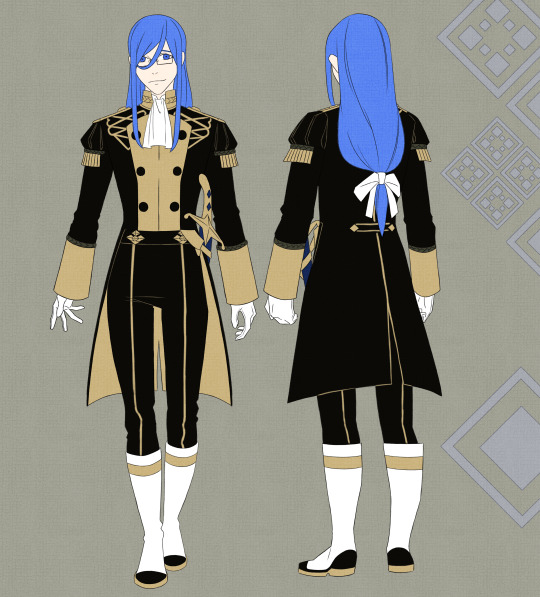
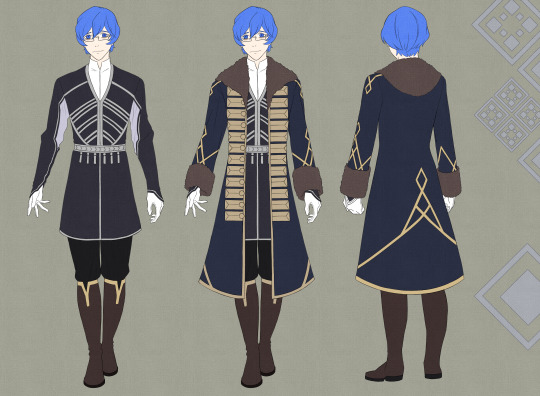
I actually have another FE3H OC, his name is Callahan Tadhg Deschamps!
A student of the Blue Lions, he's the second son of Baron Deschamps. Neglected by his parents who placed their focus onto his older brother the heir, he developed an affinity towards reading and writing, aspiring to become an author himself. However, due to his sheltered upbringing he is naive and sees the world through rose-colored lenses.
Everything here is drawn by me.
Toyhouse if anyone is interested
#callahan tadhg deschamps#fe3h oc#fire emblem three houses oc#fe3hoc#fodlansona#oc#original character#ramyeonguksu#concept art#character design#fire emblem three houses#fire emblem#blue lions#sorry he never got a three hopes design because i didn't care for him as much LMAO#so meta i neglected him over my first FE3H OC
55 notes
·
View notes
Text
I'm happy people are enjoying Hopes Claude but I don't like it coming at the expense of Houses Claude.
If only because saying he was always 'like that' misses the inherent comedy in a game spending 80+ hours telling you "there's something shifty about Claude" for his goals to be revealed as peace and racial harmony.
"My deepest secret. The thing I tell no one. The cards I hold near and dear to my chest! Is that I'm rather a decent person, actually."
#fe3h#few3h#fire emblem warriors three hopes#fire emblem three houses#few3hopes#few3h spoilers#fe3h spoilers#claude von riegan#and idk#on a meta level i always found it fitting fodlan was wrong about him
154 notes
·
View notes
Text
My Analysis of the Best Paired Endings in 3H (Part 20: Non-AM Ingrid/Ashe)
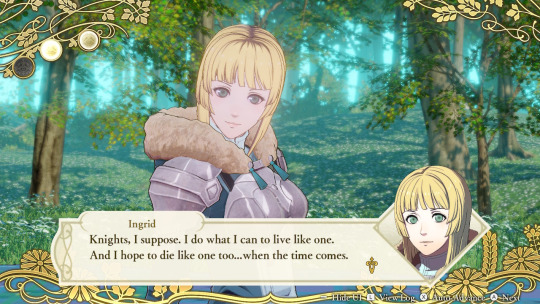
Felix: If I were to die here, would you say something like you did when it was my brother? "That's the true end for a knight."
First things first, I personally think Rodrigue's comment came off substantially worse in Japanese than it did in the localization. In English, his reaction came off more as passive acceptance. Like, "well at least he died so honorably". In Japanese, I don't think it was quite as passive. The part "だ" at the end of the sentence implied the expectation or ideal of what a knight's end should be.
Dimitri: …And you would hold up such a painful end as an ideal?
Ingrid: Painful end…? Even if it's Your Highness speaking, I cannot let that pass. Glenn gave his life for you. Yet, to put it that way…!
Dimitri: You didn't witness his final moments. …That's why you can say that.
Ingrid: …No matter what Your Highness says, he will forever be the ideal knight to me, the person to aspire to.
That was also what Ingrid thought of as the ideal death. It's how she hoped to die, when the time came. And at the very least, that probably seemed better to her than dying as a bored and lonely housewife to some nobleman she had to marry for financial reasons.
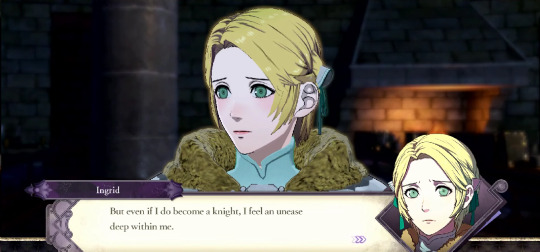
Ingrid: Now that I have parted ways with my father, there is nothing to hinder my dream. However, even if I become a knight in the future, deep inside my heart… I feel like something will always remain blocked. As someone born not as a knight but as a noble, I wonder if there was a role for me to fulfill…
In VW, Ingrid runs away from home to pursue her dream of becoming a knight. The Japanese word she used in her A-Support with Byleth was "つかえる" (tsukaeru). It means "to be blocked" or "to be obstructed." In this context, it conveys the idea of being unable to move forward emotionally or mentally. She says this no matter what route you choose. Even in AM, she had doubts about knighthood.
I believe AM!Ingrid is probably pretty happy. The Kingdom doesn't collapse, Dimitri survives to become a righteous king, she stays on good terms with her father, she can pursue her own goals instead of just getting married, and her childhood friends Felix and Sylvain are alive and well (unless you let them die in Classic Mode, I guess).
However, I also know that her non-AM endings—where she doesn't become a knight—are very popular and many consider them better than her AM endings. I completely understand why, and I actually agree with that notion very strongly. I don't think Ingrid becoming a knight after the war is necessarily terrible, especially if she has a life partner. I just think she probably experiences more positive character development and personal growth in Verdant Wind than Azure Moon.

Ingrid: ...Your Highness. I will not throw away my life for someone else's sake. ...However, would you permit me to live for someone's sake, Your Highness? Not in the sense of throwing away my life — I want to dedicate my life to you.
Dimitri: ...Wait. How should I interpret that?
Ingrid: ...? However you like, Your Highness.
In Ingrid's A-Support with Dimitri, you learn that her dream of becoming a knight was probably influenced heavily by her feelings for him. She probably had a crush on him ever since they were kids and she fantasized about being the Kyphon to his Loog. She probably thought that if she pledged her life a knight, she could be by his side, almost like a wife. And she sincerely thought that she wouldn't mind dying for him, either. It'd just be dying for the person she loved.
Dimitri: Ingrid. Once this battle is over, I want you to… ………………。...As a knight, I want you to support me. … I've been thinking of saying that for a while. We get along well, don't we?
Ingrid: … As a knight? Um, well, no! It's nothing! Of course, even without being told, I intend to fight for Your Highness… I mean, for our country.
In her A-Support, she told Dimitri that she was finally able to move on from Glenn's death now because of him. And she basically proposed to him. But he turned her down, only asking her to be his knight, not his wife. She was disappointed, but still accepted. And she serves as a knight to House Blaiddyd in most of her AM paired endings.
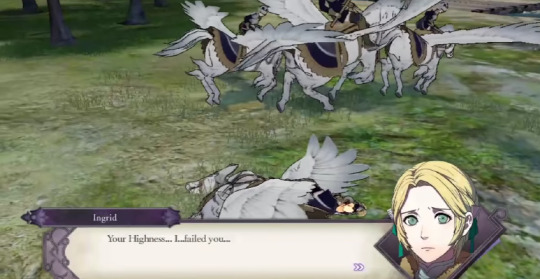
Ingrid: Whatever the path, I will fight for my lord and believe in him. ……!
In VW, Dimitri was going down a dark path, and he was willing to sacrifice all of his childhood friends just to satisfy his personal grudge against Edelgard. An unrecruited Ingrid still clung to her dream and chose to go along with whatever path her lord chose. And it's definitely portrayed as negative development for her.
Ingrid: I apologize, Your Highness… I am not… like that person…
Dimitri: Ingrid…….
I don't know why the localization changed Ingrid's VW death quote so much. But in Japanese, it gives off a completely different meaning than in English. She was, of course, referring to Glenn. It implies that she didn't feel like she could live up to being the ideal knight. When it truly came down to it, she realized that ideal wasn't what she aspired to, and she really wasn't content to lay down her life for Dimitri.
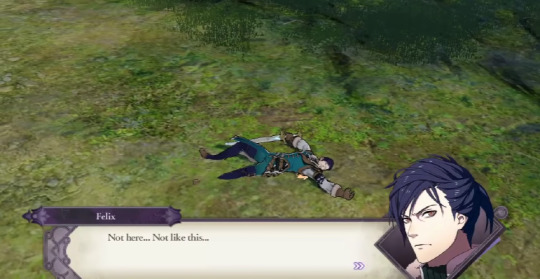
Felix: Those who want to die, step forward. …I'll cut you all down at once.
VW was absolutely NOT Felix's ideal death. His ideal death was to spend his life with Sylvain and grow old and die peacefully alongside him. Sylvain is actually the only partner Felix can't end up with in VW because he feels too guilty about living for himself. But left unrecruited, Felix will fight very hard to survive.
Felix: Gasping for air…… This place ……My place to die……
Dimitri: ……Felix.
Felix's VW death quote is very interesting in Japanese. The first time he used the word "place" he used "ところ" (tokoro) and the second time he used the word "場所" (basho). "Basho" primarily refers to a physical location. "Tokoro" is more flexible and versatile. It is often used in expressions related to time or states of being.
Sylvain: Finally… I can go to the place where they are…
Sylvain also used "tokoro" when he died in CF. This is the way I interpreted Felix's Japanese VW death quote. He was having a vision of being someplace else. Like an afterlife place. And he realized that the physical place he was in was where he was going to die.
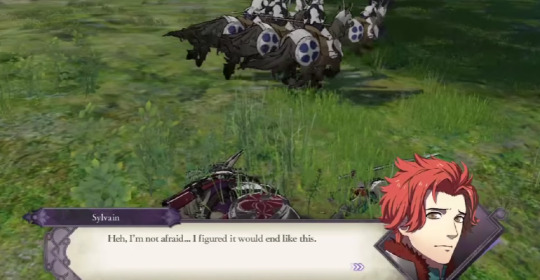
Sylvain: Well… this is fate for you. Sorry, but… quietly accept it.
Sylvain's VW battle dialogue is a bit colder in Japanese. He tells the enemy to just accept their fate, the way he thought he had to when it came to his arranged marriage. He realized it's kill or be killed. And he didn't want to die. He apologized with the word "悪い" (warui). Specifically, the word translates to "bad" or "evil." But it can also describe moral judgments or expressions of regret. Like "my bad".
Sylvain: Hey, Your Highness… enough…let's put an end to the bad dream, yeah……?
Sylvain's unrecruited death quote in VW is completely different in Japanese. In English, they just reused his Classic Mode death quote for some reason I can't understand. But in Japanese, it's interesting because the standard word for "nightmare" is "悪夢" (akumu). It is the common way to refer to a frightening or distressing dream during sleep. But Sylvain used "悪い夢" (warui yume).
While grammatically correct, it's not frequently used to describe nightmares that way in everyday language. Sylvain's dream was to die alongside Felix. But not THIS way. And in Japanese, he could only cope by telling himself that it was all just a bad dream.
Dimitri: ………………。
There are many ways to interpret Dimitri's response to Sylvain's death. Unlike with Felix and Ingrid, he didn't say his name out loud. But I don't think it was because he felt less emotion when Sylvain died. Because he also just says "……." for Mercedes. But with Sylvain, it's a much longer ellipsis. Personally, I think that Sylvain's dying words were so disturbing that he was just rendered speechless.
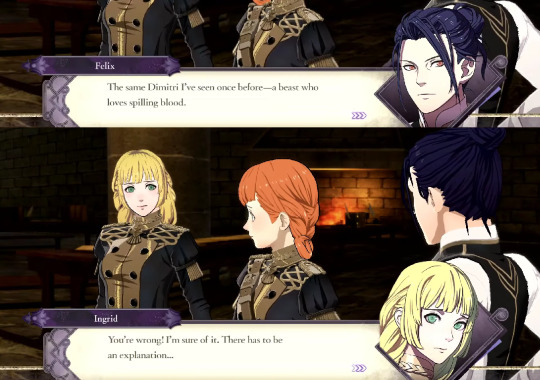
Felix: …I've known that boar prince since before birth. Before I knew it, he was always by my side… Maybe he was even my close friend.
Byleth: Maybe?
Felix: …I didn't understand his hatred or his agony toward the Empire at all. If it were me… Could I have saved him? Could I have stopped him?
After Dimitri's death, Felix used the term "親友" (shinyuu). It means "close friend" or "best friend." The localization chose "best friend". But in this context, I personally believe he was using it to mean "close friend". "Shinyuu" implies a close friendship, but it doesn't necessarily mean that they are your single closest friend like "best friend" does. Felix was saying that he used to consider himself to be close to Dimitri. But in hindsight, maybe they were never really as close as he thought they were, because he never truly understood his feelings.
Sylvain: There's nothing left after he wields his lance. It's like being hit by a great storm. …What drives him to that extent is probably his hatred toward the Empire, after all.
Byleth: Wasn't he different before?
Sylvain: Yeah... Maybe it's just that we didn't know him back then.
Sylvain has a similar line in CF where he admits that maybe they didn't really know Dimitri that well, after all. He used "we", so he was definitely including Felix and Ingrid along with himself.
Ingrid: I have known His Highness since childhood, but… I have never seen him like that before. The person we have known until now seems completely different…
And after the Holy Tomb, Ingrid admitted that she'd never seen that side of Dimitri before. She may have thought she was in love him, but she was in love with an idealized image of him based on who she knew as a kid. Not the person he really was as an adult.
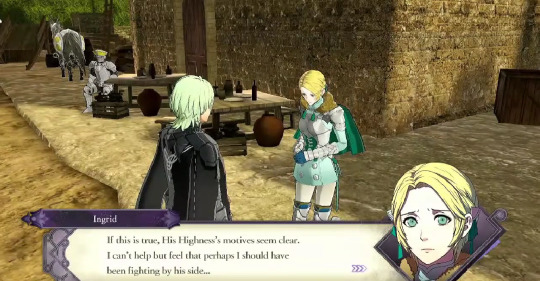
Ingrid: Among the soldiers we captured in the previous battle, there were quite a few who served His Highness. One of them told me that the Empire was involved in the "Tragedy of Duscur." If that's true, then perhaps I should have fought alongside His Highness in the army as well…
(Option 1) Byleth: Why?
Ingrid: I also… lost the person who was most important to me in that incident.
After the battle at Gronder in VW, Ingrid made it clear that Glenn was the most important person in the world to her. He was the reason she felt guilty about not fighting alongside Dimitri with the Kingdom.
(Option 2) Byleth: Do you regret it?
Ingrid: No, not now. I actually think it's better that I'm part of this army. We will carry on the wishes of those who perished. We won't let the Empire's atrocities happen again.
You gain Support points if you ask her if she regrets her decision. And she doesn't. She's glad that she survived. She spent so long idealizing a knight's death. But when it came down to it, she was glad that she didn't die mindlessly following the orders of her king. This is especially poignant if you didn't recruit her childhood friends Felix and Sylvain, who did die painfully, never fulfilling their own dreams.
Ingrid: What will happen to Faerghus… to Fódlan, once this battle is over?
Byleth: There will be peace.
Ingrid: Peace… you say. I don't wish for such grand things. But… I just want a world where people are no longer dragged into conflict and schemes, where there is no suffering, no loss of life. No… I believe it's our duty as survivors to create such a world.
Ingrid experiences very positive character growth when she lets go of her childhood dream to become a knight and finds a new purpose.
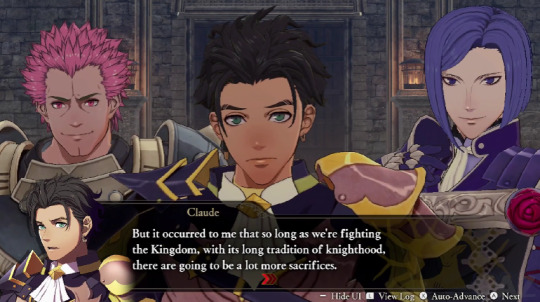
王道 (Ōdō):
-王 (Ō) means "king" or "monarch," while 道 (dō) means "way" or "path."
-王道 generally refers to the "right" or "proper" way of doing things, often associated with traditional or conventional norms, values, and principles.
-It can also refer to the "path of the king" or the ideal path of leadership that embodies virtues such as wisdom, benevolence, and justice.
-王道 emphasizes legitimacy, morality, and adherence to established rules and traditions in governance or leadership.
The developers said the CF represented 覇道 (Hadō) and AM represented 王道 (Ōdō). In that case, VW would be somewhere in-between. 王道 emphasizes moral, legitimate, and traditional leadership principles, whereas 覇道 suggests a more aggressive pursuit of dominance, often without regard for moral or ethical considerations. The positive side of AM is that Dimitri eventually does become a benevolent monarch.
Dimitri: Ashe, what do you think a knight is?
Ashe: Huh? Someone who risks their life to protect the people, the king, and ultimately, the country…?
Dimitri: Indeed… Many say that's what a knight should be… But the reality isn't so beautiful. Ultimately, a knight is someone who kills. The chivalric code preaches loyalty only to control knights and prevent them from betraying their liege.
But the downside is perhaps that it ends too conventionally. AM overall sticks to the "proper" and traditional way of doing things, which Claude was opposed to. And I would say that Claude was opposed to those traditions for good reason.
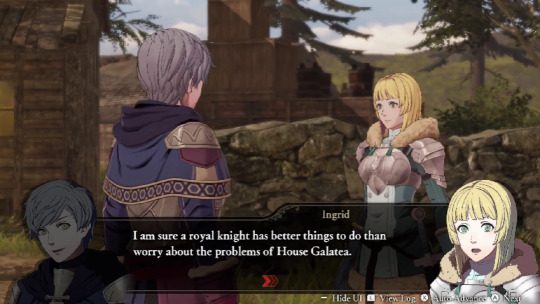
Ingrid & Ashe (Non-AM)
Ingrid pleaded for the survival of the confiscated Galatea territory and was appointed its new lord. To support her, Ashe headed to Galatea territory. There, he faced the cold gaze of the people directed towards Ingrid, who had once fled from the Galatea family. Ashe supported Ingrid devotedly and worked hand in hand to reform the territory and improve agricultural techniques. Gradually, as people witnessed their efforts, the attitude of the residents softened. Eventually, the two, who had come to love each other, received a grand blessing from the residents and held a simple yet lively wedding ceremony.
I still think that Ashe is a fantastic partner for Ingrid in VW. And from an objective standpoint, I do think that this is a better ending than their AM counterpart. I think that helping Galatea become more fertile would be more fulfilling for both Ingrid and Ashe than becoming knights. But in VW, Ingrid's childhood friend group is pretty much decimated, which is a high price for her to pay.
7 notes
·
View notes
Text
Thoughts and ponderings on how to make the Golden Deer eviler™ and more involved in Fódlan politics and the war and why that would be good for the worldbuilding (note: GD are my faves)
First and most obvious imo: war profiteering. It would help establish their character as mercantilists who can be just as cruel as others even without direct bloodshed, if they sold supplies and weapons to both Adrestia and Faerghus over the five years and profitted off said bloodshed.
Extension of the above: price gouging. Oh your country had bad harvests this year? That's so sad. So, how much are you willing to pay to make sure your troops don't starve?
More extension of the above: loan shark shit. Especially cruel if Adrestians and Faerghans are forced to borrow from a Leicesterian cartel just so they can buy stuff from... another Leicesterian cartel.
Possibly the final boss of "evil shit to sell during a war": drugs. The frontlines are said to have been in a stalemate for a while, meaning the soldiers are just stuck there up north without making much progress, for a couple years. That must be painful both physically and psychologically. Thankfully, your good friends from the Alliance have juuuust the thing to make you forget the painful reality! Ever heard of opium?
If that's not enough action, then how about: Leicester doing various operations to keep the conflict going and ensure that it can't end, either by compromise or surrender. Sabotage potential deals, do false flag operations, anything to make sure the Kingdom and Empire both fight until the last soldier, because that way they won't have any left to attack the Alliance with.
There must be desperate people escaping Kingdom and Empire and coming to the Alliance for various reasons. But it's difficult to feed all these new mouths, not to mention that it might aggro the Empire if they accept too many people from Faerghus or defectors from Adrestia. What's Leicester to do? Use them as slave labor in some remote place like the Goneril mines, obviously. They've trafficked Almyrans, they'll gladly do it to Adrestians and Faerghans, too.
Aside from making Leicester more involved in the politics, I think this is a good way to justify and set up a true three-way conflict instead of Kingdom vs Empire feat Alliance.
For the Empire, it gives a good reason for them to go on an active military campaign against Leicester (as in CF) before heading to crush the Kingdom. "Evil underhanded motherfuckers are trying to destroy us by selling us drugs and sabotaging our operations, we can't let that stand for the future of Fodlan" + stomp on them to make sure they don't try any funny business in the future.
For the Kingdom, well... I think it makes it somewhat harder to justify the Derdriu rescue part in AM*, but I do think it gives more justification to why they're totally unwilling to cooperate with the Alliance at Gronder, even aside from Dimitri being feral. Like from their POV, tf you mean "what does it achieve," you put us in debt and destroyed our economy and now you're trying to imply we should team up?
(*If it's presented the same as in canon, I think it can still work if it's framed slightly differently, like Leicester growing desperate enough to grovel for help from the same faction they were previously trying to sabotage and Dimitri decides to do it for the greater good and the future of Fódlan instead of holding a grudge)
Also a good way to fuel tension between Church and Alliance in VW even though they work together; Alliance uses the fact they've got the money to basically blackmail Church into giving them legitimacy for propaganda purposes, Church thinks Alliance is dangerous and unfaithful, partially because they've got sticks up their ass but also because they are, in fact, kinda fucked up. (And Byleth is just stuck mediating between the two rip)
Most of all, this is my personal taste but I like that it makes Fódlan even bleaker than it already is. Like if you take a step back and just look at the factions as nations instead of focusing on the virtues of the individual leaders, it's: superiority complex irredentist imperialists vs inflexible outdated zealots vs greedy backstabbing opportunists, feat. religious institution that has long since grown corrupt and complacent. If you are a random person (probably commoner) in Fódlan who does not know the leaders personally, war would look pretty bleak, especially the longer it goes on. It would look like no matter which faction wins, the average person would lose.
And I think that would make it all the more impactful when Byleth appears and ends the war, especially in SS. The chosen one and savior isn't a noble raised to lord (lol) over others, it's someone raised as a commoner* doing the dirty work (fighting and killing) for others. When they get to lead and/or the leaders listen to them, something finally changes. I have issues with how Byleth was handled as a character in base Houses (even though I grew to like them eventually), but I still think their existence and role is nice symbolically and thematically.
(*You can argue that Byleth isn't a "regular commoner" considering the Crest + their heritage, but like, they don't know about the Crest until they've lived ~20 years as a merc and in some routes they don't even fully learn about the heritage so for all practical purposes they lived and grew up as a commoner)
Think I went on a bit of a tangent but the point is: let the Golden Deer and Leicester be evil, I think it would have been really fun if they destroyed the other two countries' economies with the power of money and friendship* then had a feast afterwards like a bunch of psychopaths (*among themselves I mean, not friendship with the other factions).
#fe3h#fire emblem three houses#meta#i think#golden deer#leicester alliance#the virgin 'my fave did nothing wrong'#vs the chad 'my fave needs to do more wrong and everyone needs to commit more atrocities in general'#slotalks#fe3h meta
19 notes
·
View notes
Text
Alright. A while back, I answered a question regarding Claude.
The post was not good. I'll be the first to admit that I have problems with replaying games on multiple routes because I'm the kind of person that gets overwhelmed easily by so much stuff being thrown at me at once. Couple that with my issues in regards to playing games and actively making things worse (I mean I'll be the first to admit that I doom search stuff when I feel awful) AND my assuming I could just wing it without any regards to proper research, which led to a really badly worded and misrepresentation of the character. Regardless of my feelings towards Claude, nobody should get the shaft like I gave him.
For that, I apologize and I'm releasing this...I guess you could say an updated continuation of the post. I also rereleased the original and included a link so you know where I'm coming from so you can judge it in full. Here I'm just going to go through some of the big sticking points and screw-ups I made one by one.
A big thanks in advance for my friends on discord for pointing them out.
Not well-liked in either country due to his mixed heritage, he was raised in the Leicester Alliance and basically is representative of their policies.
Claude was actually raised in Almyra, not in the Alliance. He only made the transition till he was old enough to understand the situation between Fodlan and Almyra in greater detail. The two countries were political enemies, so the idea of somebody of Fodlan descent because of their parents (King of Almyra and a Duchess of Leicester) becoming king didn't win him any favors back home. Neither did his being from Almyra make him popular with the Alliance. Really part of the reason he made the transition between countries was that he wanted to open up borders and ease tensions between Almyra and Fodlan from within Fodlan's system. Which is an admirable goal, obviously.
Sadly, I screwed up since I inadvertently downplayed his childhood with Almyra by implying he was raised in the Alliance. While he definitely picked up a few habits from the Alliance, he also got a lot of his habits of secrecy since he likely wasn't all that well-liked back home. I mean he did have allies, obviously. Nader served as his combat instructor and was willing to lend his forces when called upon. But it wasn't universal. As such, I apologize for muddling up his motivations and downplaying his heritage.
Speaking of Nader...
Which comes to a head in the war. When Edelgard declares war on the Church, Claude effectively decides to stay out of it. Mainly, he essentially locks the nobility of Leicester in a bit of a stalemate for 5 years to keep themselves out of the war. His long-term strategy is to get reinforcements from Almyra so they could effectively steamroll the Kingdom and Empire who bloodied themselves from all the fighting.
And his focus on relying on his Almyran reinforcements isn't even foolproof in of itself since...well, he's relying on foreign troops arriving in a country that hates their guts. Even if the war goes in his favor, that's a bit of a hill to climb.
Yeah. I really screwed up here. While it is true that Claude probably would've used the chaos created by the war in order to restructure Fodlan similar to Edelgard and probably wouldn't have wanted to get involved in the war right away, I was wrong about the nature of his reinforcements from Almyra. Again, in Verdant Wind, he called upon Nader in order to take the strategically important Fort Merceus in his campaign against the Empire. In Crimson Flower, he only called them when Edelgard invaded Leicester. There was no indication that he would use his forces to steamroll Fodlan in a colonialist matter, which I implied. He was fit to rely mostly on Alliance forces until the need demanded help from Almyra.
As a result, I misrepresented his character, and I apologize. While I'm still not a huge fan of Claude and don't think Verdant Wind is the best route for Fodlan (it ends with another leader backed by the Church in charge with Byleth...which is the same structure that led to this whole mess to begin with), I got his character wrong and made him worse for it. I...understand why people weren't happy with the first post and feel free to call me out on that. I promise to do more research in the future on the other routes if I make any more Three Houses posts.
#claude von riegan#claude fire emblem#claude meta#fire emblem three houses#three houses#fire emblem 3 houses
8 notes
·
View notes
Text

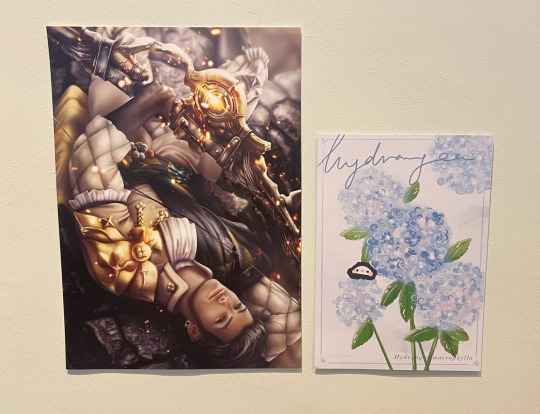
Used up all of my Blu tack just to get all of the poster and prints put up.
#rubi’s post#meta#personal#IRL#fire emblem three houses#honkai star rail#claude von riegan#dan heng#jing yuan#welt yang#gepard landau#sampo koski
20 notes
·
View notes
Text
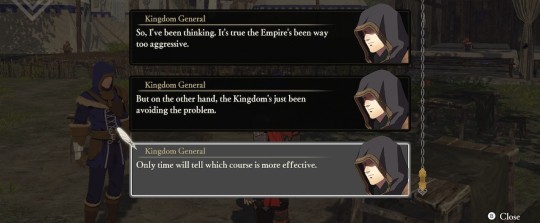
Love that this game, for all its flaws, brings up important points like this.
The Empire is using brute, indomitable force to create reform. The Kingdom is avoiding a very necessary confrontation about how the Church has exploited their nation.
Both choices can lead to results.
But they have different costs. War on the scale that Edelgard is waging destroys the land in part, leaves people in mourning, and generally creates tension in the aftermath. The reform will be swift and broad, however, changing so many lives for the better.
Those whose lives were changed for the worse will have formerly been the most affluent and wealthiest members of society. They're used to getting their way and aren't afraid to be underhanded. Who's to say they won't try to keep fighting this societal growth for generations to come?
Meanwhile, the Kingdom is trying to cooperate with the presence of an organized religion that is deeply disrespectful and entitled. Tell me that just anyone could take refuge in Faerghus and try to command the Kingdom's military forces when the King himself barely got a sentence in:

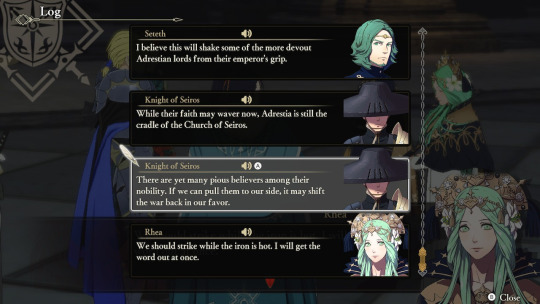
[Read the whole spiel around this and grey morality here]
By not making waves, they're more likely to make lasting reform. It happens gradually, though, and more people suffer from oppression and power imbalance while they take their time working around a religious tyrant.
The point is that they're both bad. They both leave innocent people to suffer in perfectly preventable situations. What we all need to take away from FE3H and FEW3H is that there is not a perfect answer. There is no ideal outcome. Everyone at the head of each route is doing what they think is right with the information they have.
...That said, I am a sucker for a Golden Route because fiction is made for daydreams, lol.
#fe3h#few3h#dimitri alexandre blaiddyd#edelgard von hresvelg#fire emblem#fire emblem three houses#fire emblem three hopes#faerghus#adrestia#grey morality#quillful thoughts#my meta#few3h spoilers#fe3h spoilers#spoilers#rhea discourse#rhea critical#we love seteth in this house fyi#long post#long text
39 notes
·
View notes
Text
Old guard Fire Emblem fans like to complain about all the drama Three Houses brought to the fandom, as if we weren’t arguing just as fiercely back in the day.
Real fans remember Priam’s parentage drama/IkeSoren shipping war, Fates name translation drama, petting mini game drama, Azura/Corrin cousin incest drama.
Hell from what I’ve read, people were fighting in the fucking trenches back in the old forum days over who Roy’s one true love is. And if you go back even farther, over who Lachesis should end up with.
#fire emblem#Fire emblem meta#fire emblem three houses#fire emblem awakening#fire emblem binding blade#fire emblem genealogy of the holy war#I was a fateswakening baby
17 notes
·
View notes